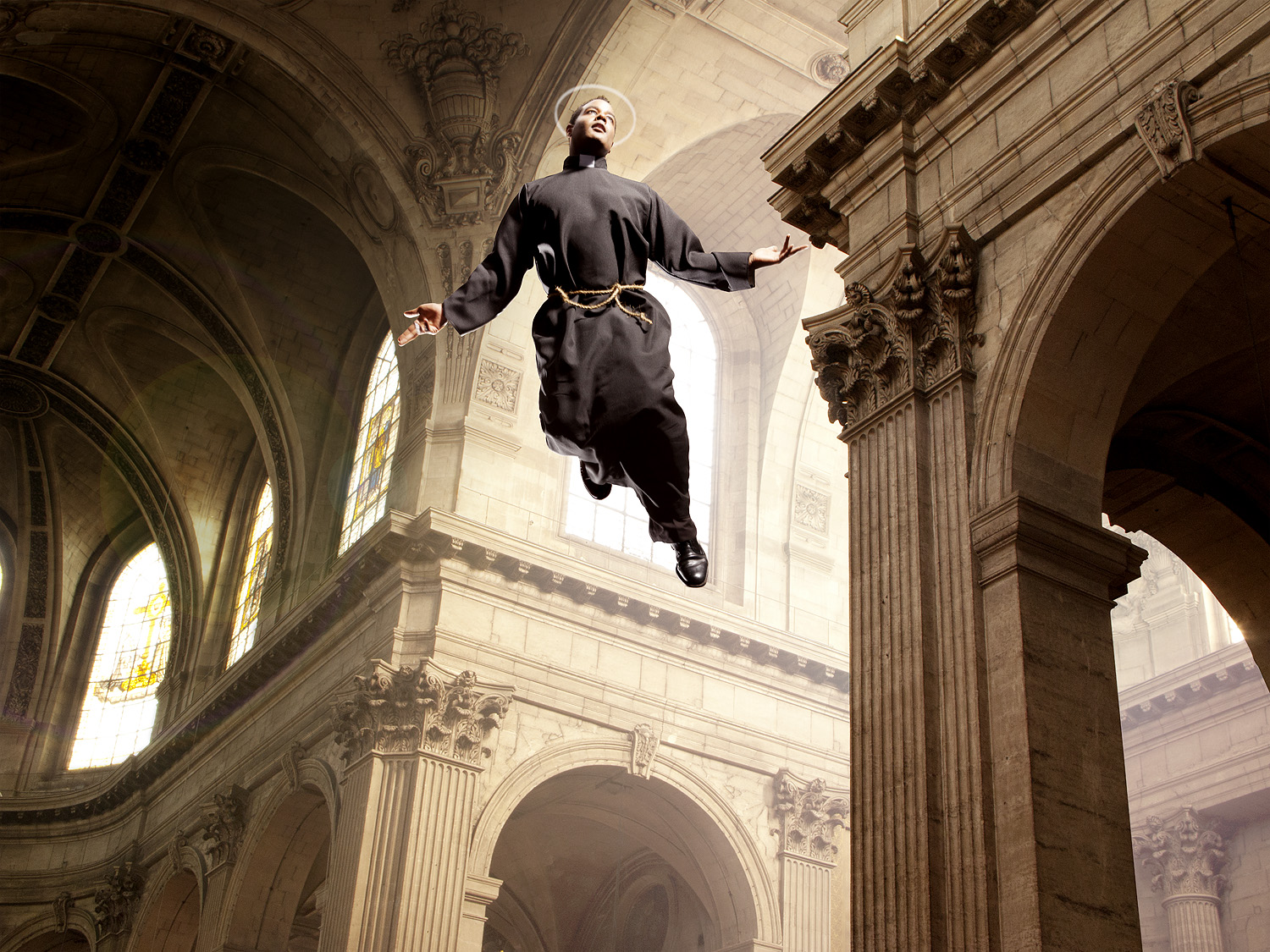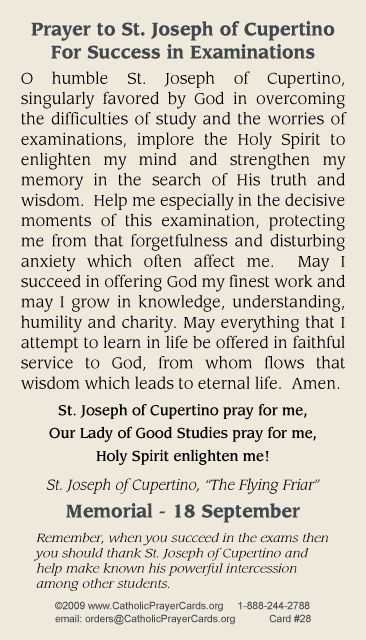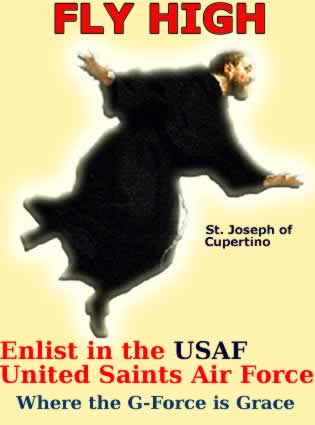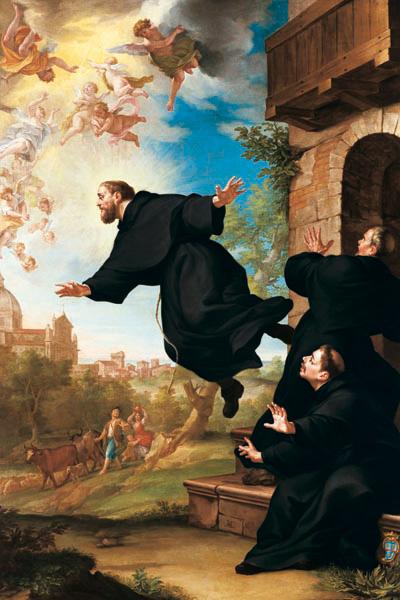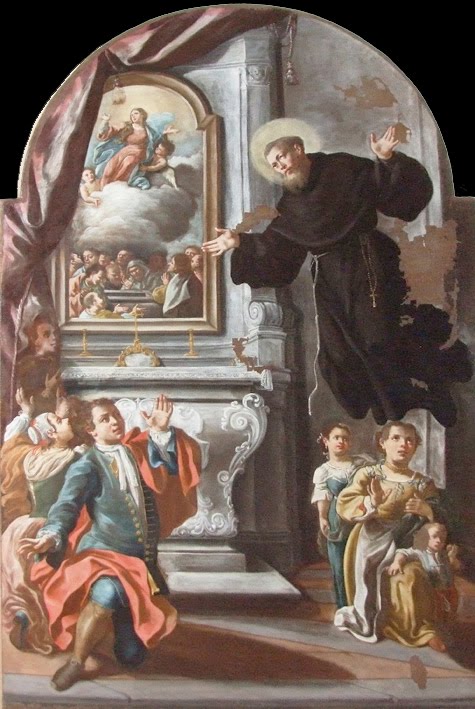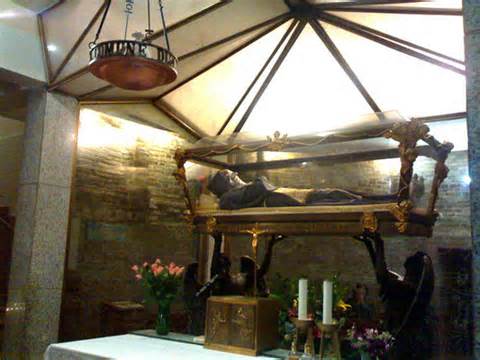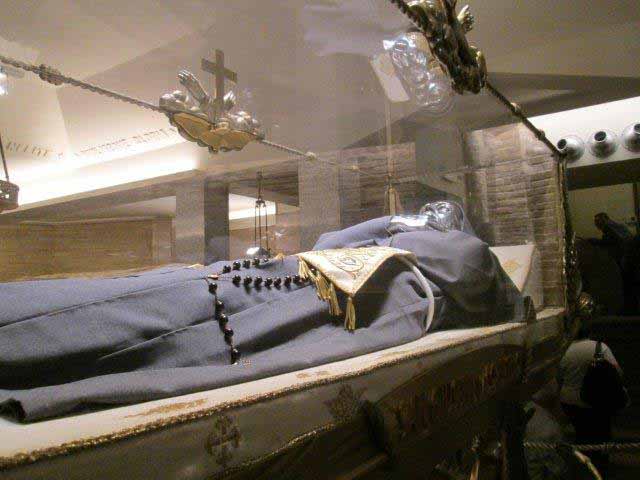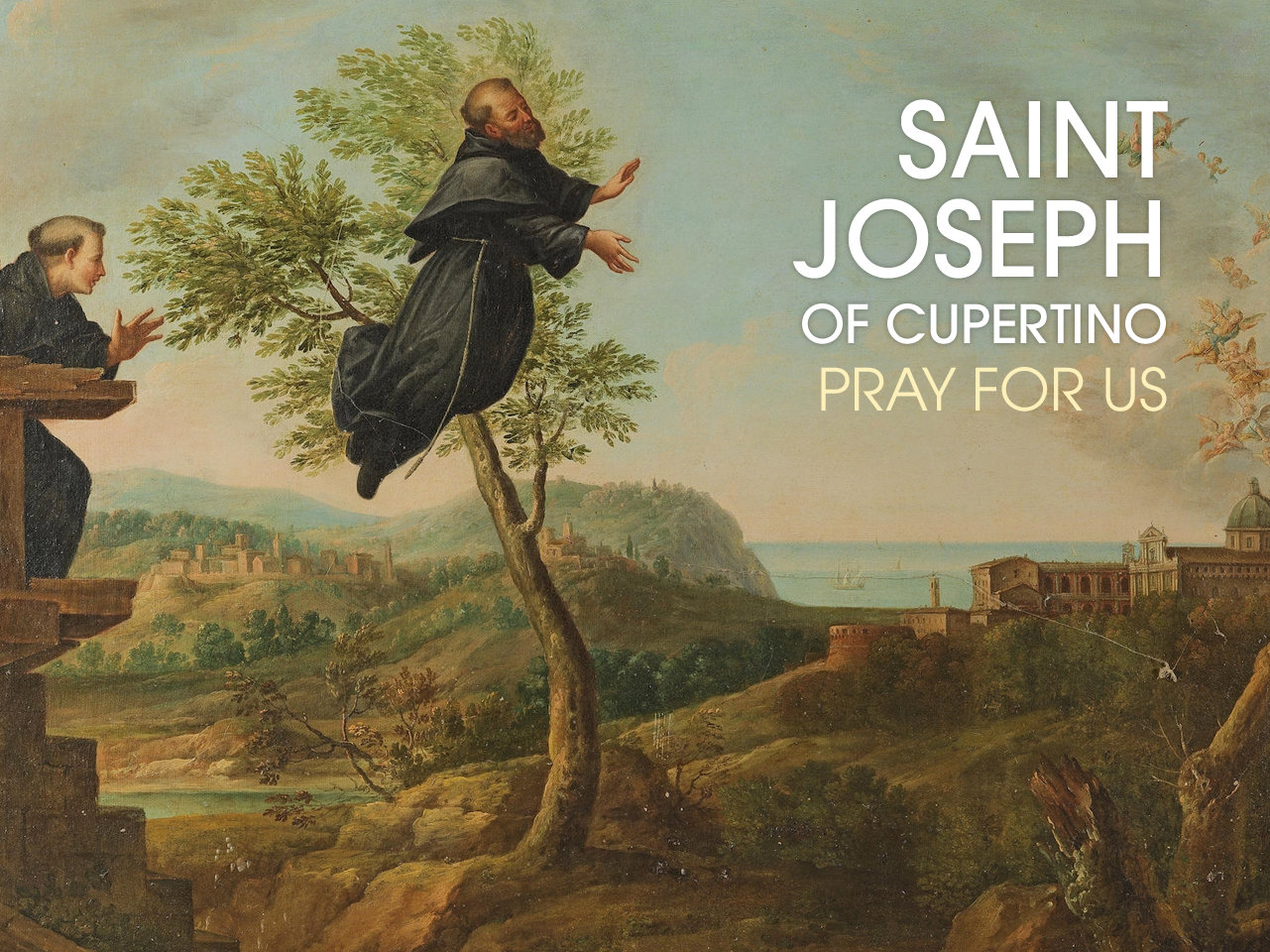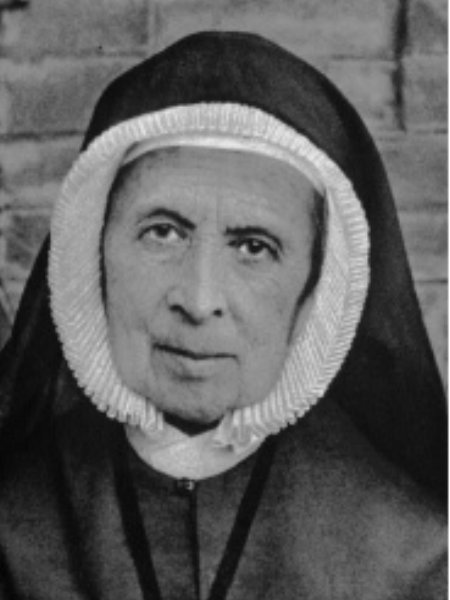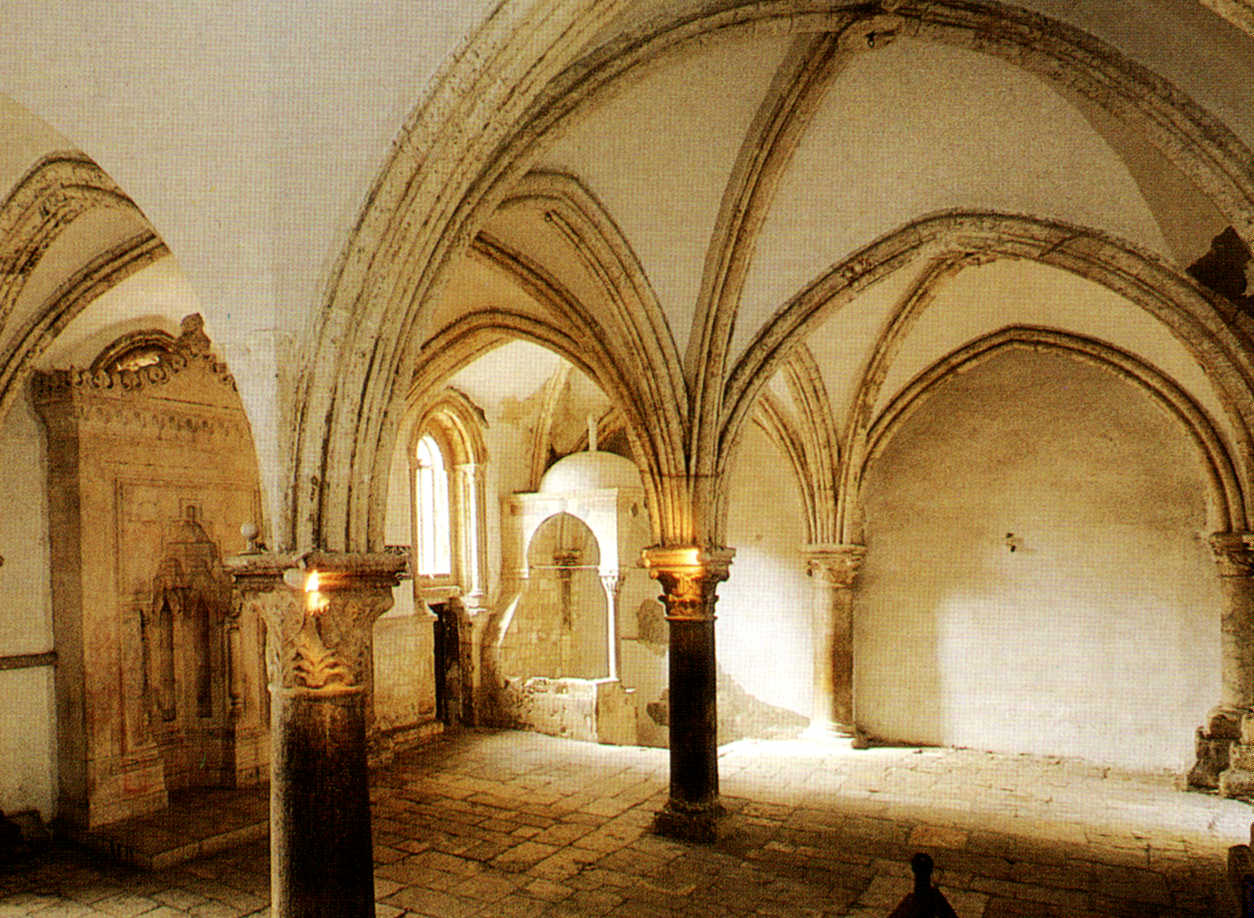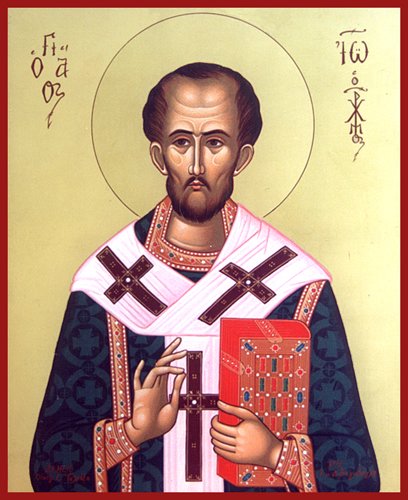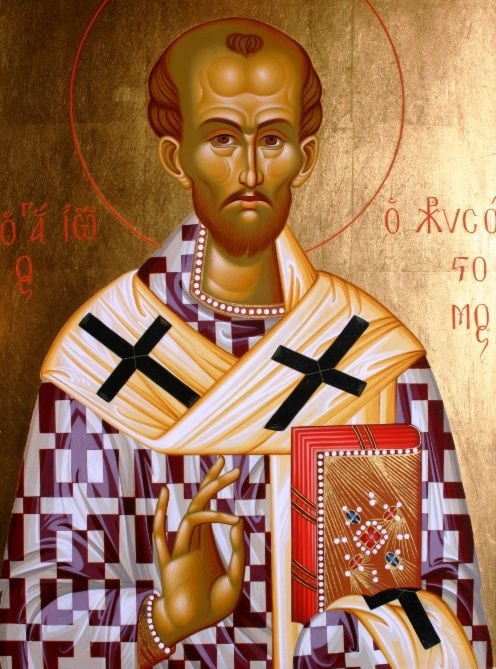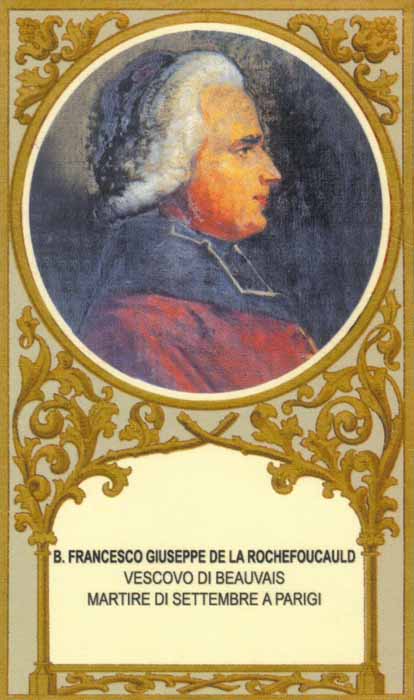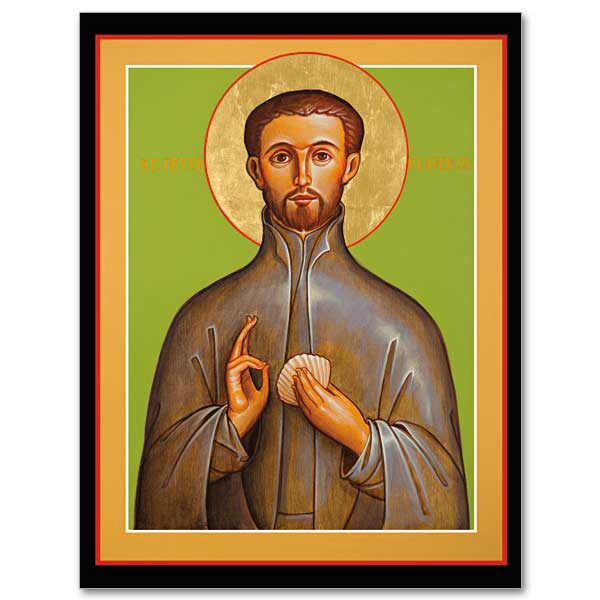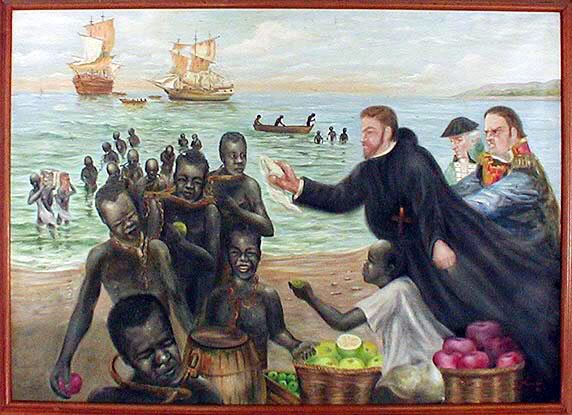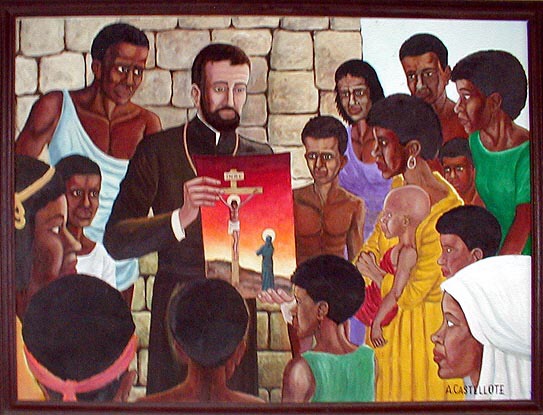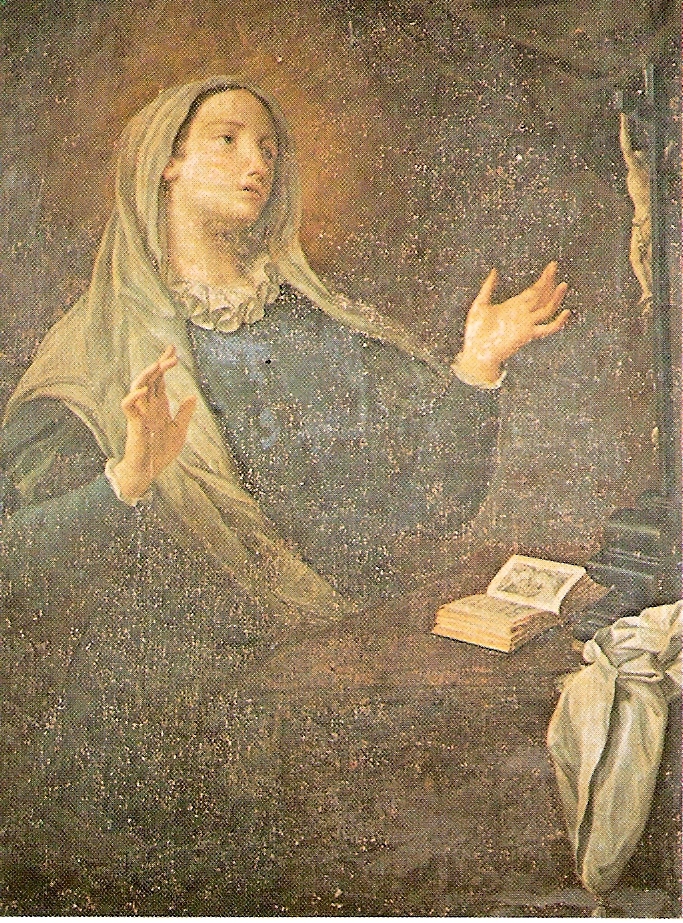
-Saint Catherine of Genoa adoring the Crucified Christ, by Giovanni Agostino Ratti
I LOVE MARRIED SAINTS!!!!! DID I MENTION I LOVE MARRIED SAINTS????!!!! It is NOT any oxymoron, but rather our Christian duty and our obligation due to Almighty God & our spouse.
Born an aristocrat in Genoa in 1447 in the Vico del Filo and baptized as Caterina Fieschi, the youngest of five children, Catherine’s parents were Jacopo Fieschi and Francesca di Negro. Catherine’s family had papal connections. She was related to Pope Innocent V and Pope Adrian V, and Jacopo became Viceroy of Naples. When Catherine was born, many Italian nobles were supporting Renaissance artists and writers. The needs of the poor and the sick were often overshadowed by a hunger for luxury and self-indulgence.
She was known to be pious and prayerful even as a young girl. “Taller than most women, her head well proportioned, her face rather long but singularly beautiful and well shaped, her complexion fair and in the flower of her youth rubicund, her nose long rather than short, her eyes dark and her forehead high and broad; every part of her body was well formed”, Catherine wished to enter a convent when about thirteen, perhaps inspired by her sister, Limbania, who was an Augustinian nun, but the nuns to whom her confessor applied refused her on account of her youth, after which she appears to have put the idea aside without any further attempt.
Her father, Jacopo, passed away shortly after this. Her eldest brother, Giacomo inherited everything. He wishing to resolve differences with the Adorno family, another noble family with whom the Fieschi’s were at odds, and so concocted the idea of marrying Catherine to the Adorno boy, Giuliano, who had returned to Genoa to marry after various military and trading experiences in the Middle East.
Giacomo obtained his mother’s support and found Giuliano more than willing to accept the beautiful, noble and rich bride proposed to him; as for Catherine herself, she would not refuse this cross laid on her at the command of her mother and eldest brother. On 13 January, 1463, at sixteen, Catherine was married to the young Genoese nobleman, Giuliano Adorno. Giuliano was described by a witness of the time to be possessed of a “strange and recalcitrant nature” who wasted his substance on disorderly living including gambling.
The childless marriage turned out wretchedly; Giuliano proved faithless, violent-tempered, and a spendthrift, who made the life of his wife a misery. He was careless and unsuccessful as a husband and provider, often cruel, violent and unfaithful, and reduced them to bankruptcy. Catherine became indifferent to her faith, and fell into a depression.
Details are scanty, but it seems at least clear that Catherine spent the first five years of her marriage in silent, melancholy submission to her husband; and that she then, for another five, turned a little to the world for consolation in her troubles. She tried to find serenity in the distractions of the world. As always, it didn’t work.
Catherine, living with Giacomo in his fine house in the Piazza Sant’ Agnete, at first entirely refused to adopt his worldly ways, and lived “like a hermit”, never going out except to hear Mass. But when she had thus spent five years, she yielded to the remonstrances of her family, and for the next five years practiced a certain commerce with the world, partaking of the pleasures customary among the women of her class but never falling into sin. Increasingly she was irked and wearied by her husband’s lack of spiritual sympathy with her, and by the distractions which kept her from God. Then, ten years after her marriage, she prayed “that for three months He (God) may keep me (Catherine) sick in bed” so that she might escape her marriage, but her prayer went unanswered.
Catherine became so despondent with a profound sense of emptiness and bitterness, she went to talk to her sister, Limbania, at the convent to unload her woes. After listening, Limbania insisted Catherine return the following day and make her confession to the confessor of the nuns at the convent. On 22 March 1473, while making this confession, Catherine was struck down by a vision, the revelation of God’s love and her own sinfulness, and fell into a religious ecstasy; her interior state, and her contact with the Truth she had received in the vision, stayed with her the rest of her life.Suddenly, as she was kneeling down at the confessional, Catherine explained “my heart was wounded by a dart of God’s immense love, and I had a clear vision of my own wretchedness and faults and the Most High Goodness of God. She fell to the ground, all but swooning/fainting”, of this experience she later wrote her heart cried out, “no longer the world, no longer sin”. The confessor was at this moment called away, and when he came back she could speak again, and asked and obtained his leave to postpone her confession. After this revelation occurred she abruptly left the church, without finishing her confession. This marked the beginning of her life of close union with God in prayer.
She hurried home, to shut herself up in the most secluded room in the house, weeping, and for several days she stayed there absorbed by consciousness of her own wretchedness and of God’s mercy in warning her. She had a vision of Our Lord, weighed down by His Cross and covered with blood, and she cried aloud, “O Lord, I will never sin again; if need be, I will make public confession of my sins.” It was an experience she found difficult/nearly impossible to describe. “Oh, Love! Can it be that You have called me with so much love, and revealed to me at one view, what no tongue can describe?…I have no longer either soul or heart; but my soul and my heart are those of my Beloved…”.
She now entered on a life of prayer and penance. She obtained from her husband a promise, which he kept, to live with her as a brother. She made strict rules for herself–to avert her eyes from sights of the world, to speak no useless words, to eat only what was necessary for life, to sleep as little as possible and on a bed in which she put briars and thistles, to wear a rough hair shirt. Every day she spent six hours in prayer. She rigorously mortified her affections and will.
Soon, guided by the Ladies of Mercy, she was devoting herself to the care of the sick poor. In her plain dress she would go through the streets and byways of Genoa, looking for poor people who were ill, and when she found them she tended them and washed and mended their filthy rags. Often she visited the hospital of St. Lazarus, which harbored incurables so diseased as to be horrible to the sight and smell, many of them embittered. In Catherine they aroused not disgust but charity and love; she met their insults with unfailing gentleness.
From the time of her conversion she hungered insatiably for the Holy Eucharist, and the priests admitted her to the privilege, very rare in that period, of daily communion. Once upon receiving Communion, Catherine gazed towards her Lord and said, “O Lord, perhaps Thou wouldst draw me to Thee by this fragrance? I do not desire it; I desire nothing but Thee, and Thee wholly; Thou knowest, that from the beginning, I have asked of Thee the grace that I might never see visions, nor receive external consolations, for so clearly do I perceive Thy goodness, that I do not seem to walk by faith but by a true and heartfelt experience.”
For twenty-three years, beginning in the third year after her conversion, she fasted completely throughout Lent and Advent, except that at long intervals she drank a glass of water mixed with salt and vinegar to remind herself of the drink offered to Our Lord on the cross, and during these fasts she enjoyed exceptional health and vigor. For twenty-five years after her conversion she had no spiritual director except Our Lord Himself. Then, when she had fallen into the illness which afflicted the last ten years of her life, she felt the need for human help, and a priest named Fr. Cattaneo Marabotto, who had a position of authority in the hospital in which she was then working, became her confessor. To him she explained her states, past and present, and he compiled the “Memoirs”.
The time came when the directors of the great hospital in Genoa asked Catherine to superintend the care of the sick in this institution. She accepted, and hired near the hospital a poor house in which she and her husband lived out the rest of their days. Her prayers were still long and regular and her raptures frequent, but she so arranged that neither her devotions nor her ecstasies interfered with her care of the sick. Although she was humbly submissive even to the hospital servants, the directors saw the value of her work and appointed her rector of the hospital with unlimited powers.In 1497 she nursed her husband through his last illness. In his will he extolled her virtues and left her all his possessions. After Giuliano’s death, her life was devoted to her relationship with God, through “interior inspiration” alone. She used no other and needed no other forms of prayer.
When Catherine was fifty-three, she fell ill. Worn out by her life of ecstasies, her burning love for God, labor for her fellow creatures and her privations; during her last ten years on earth she suffered much. She died in 1510, worn out with labors of body and soul. Her death had been slow with many days of pain and suffering as she experienced visions and wavered between life and death.
In 1551, 41 years after her death, a book about her life and teaching was published, entitled “Libro de la vita mirabile et dottrina santa de la Beata Caterinetta de Genoa”. This is the source of her “Dialogues on the Soul and the Body” and her “Treatise on Purgatory”. It is her writings that have continued her fame today; during her canonization inquiry, the Holy Office announced that her writings alone were enough to prove her sanctity. Her writings also became sources of inspiration for other religious leaders such as Saints Robert Bellarmine and Francis de Sales and Cardinal Henry Edward Manning.
Catherine wrote about purgatory which, she said, begins on earth for souls open to God. Life with God in heaven is a continuation and perfection of the life with God begun on earth. For Catherine, purgatory was not another physical place to go to atone for one’s sins, but rather, an interior cleansing. She speaks of the soul’s purification onto complete union with God. “The soul”, Catherine says, “presents itself to God still bound to the desires and suffering that derive from sin and this makes it impossible for it to enjoy the beatific vision of God”. Catherine asserts that God is so pure and holy that a soul stained by sin cannot behold/be in the beatific vision, the presence of the Divine Majesty. The soul is aware of the immense love and perfect justice of God and consequently suffers for having failed to respond in a correct and perfect way to this love; and love for God itself becomes a flame, love itself cleanses the soul from the residue of sin. In writing about purgatory, Catherine reminds us of a fundamental truth of faith that becomes for us an invitation to pray for the deceased so that they may attain the beatific vision of God in the Communion of Saints (cf. Catechism of the Catholic Church, n. 1032).
St Catherine of Genoa is patroness of Brides, Childless People, Difficult Marriages, People Ridiculed For Their Piety, Victims Of Adultery, and Widows, among other causes.
“We should not wish for anything but what comes to us from moment to moment, exercising ourselves none the less for good. For he who would not thus exercise himself, and await what God sends, would tempt God. When we have done what good we can, let us accept all that happens to us by Our Lord’s ordinance, and let us unite ourselves to it by our will. Who tastes what it is to rest in union with God will seem to himself to have won to Paradise even in this life.” -St Catherine of Genoa
“It remains for us to pray the Lord, of His great goodness and by the intercession of this glorious Seraphim, to give us His love abundantly, that we may not cease to grow in virtue, and may at last win to eternal beatitude with God who lives and reigns for ever and ever.” –St Catherine of Genoa
“Since I began to love, love has never forsaken me. It has ever grown to its own fullness within my innermost heart.” –St Catherine of Genoa
“If it were possible for me to suffer as much as all the martyrs have suffered, and even Hell itself, for the love of God, and in order to make satisfaction to Him, it would be after all only a sort of injury to God, in comparison with the love and goodness with which He has created, and redeemed, and, in a special manner, called me. For man, unassisted by God’s grace, is even worse than the devil, because the devil is a spirit without a body, while man, without the grace of God, is a devil incarnate. Man has a free will, which, according to the ordination of God, is in nowise bound, so that he can do all the evil that he wills; to the devil, this is impossible, since he can act only by the divine permission; and when man surrenders to him his evil will, the devil employs it, as the instrument of his temptation.”-St Catherine of Genoa
“The souls in Purgatory see all things, not in themselves, nor by themselves, but as they are in God, on whom they are more intent than on their own sufferings. . . . For the least vision they have of God overbalances all woes and all joys that can be conceived. Yet their joy in God does by no means abate their pain. . . . This process of purification to which I see the souls in Purgatory, subjected, I feel within myself.” -St Catherine of Genoa“I see that whatever is good in myself, in any other creature, or in the saints, is truly from God; if, on the other hand, I do any thing evil, it is I alone who do it, nor can I charge the blame of it upon the devil or upon any other creature; it is purely the work of my own will, inclination, pride, selfishness, sensuality, and other evil dispositions, without the help of God I should never do any good thing. So sure am I of this, that if all the angels of heaven were to tell me I have something good in me, I should not believe them. So long as any one can speak of divine things, enjoy and understand them, remember and desire them, he has not yet arrived in port; yet there are ways and means to guide him thither. But the creature can know nothing but what God gives him to know from day to day, nor can he comprehend beyond this, and at each instant remains satisfied with what he receives. If the creature knew the height to which God is prepared to raise him in this life, he would never rest, but on the contrary would feel a certain craving, a vehement desire to reach quickly that ultimate perfection, and would think himself in Hell until he had obtained it.”-St Catherine of Genoa
“If it were given to a man to see virtue’s reward in the next world, he would occupy his intellect, memory and will in nothing but good works, careless of danger or fatigue.” – St Catherine of Genoa
“We must not wish anything other than what happens from moment to moment, all the while, however, exercising ourselves in goodness. And to refuse to exercise oneself in goodness, and to insist upon simply awaiting what God might send, would be simply to tempt God.”
–St. Catherine of Genoa
“I see clearly with the interior eye, that the sweet God loves with a pure love the creature that He has created, and has a hatred for nothing but sin, which is more opposed to Him than can be thought or imagined.”
–St. Catherine of Genoa
“The fullness of joy is to behold God in everything.” -St. Catherine of Genoa
“The greatest suffering of the souls in purgatory, it seems to me, is the awareness that something in them displeases God, that they have deliberately gone against His great goodness. I can also see that the divine essence is so pure and light-filled—much more than we can imagine—that the soul that has but the slightest imperfection would rather throw itself into a thousand hells than appear thus before the divine presence.”
—St. Catherine of Genoa
Shortly before her death Catherine told her goddaughter: “Tomasina! Jesus in your heart! Eternity in your mind! The will of God in all your actions! But above all, love, God’s love, entire love!”
“Through the words of this great Saint and the Gift that God had Graced her, we have gained a better understanding of the graphic damage that sin can do to a soul and also how the soul can be restored back to God’s Loving embrace through participation of the Sacraments. We also understand how God can transform a soul to be a divine reflection of Himself when the soul surrenders itself to the Triune Spirit. And through the works of Saint Catherine we also understand Purgatory and the Holy Souls who wait to be released into Heaven by our prayers and penances and when we offer up a Mass for the repose of their soul as these Holy souls endure the purgation of Purgatory, as they thirst to be re-united with God in Heaven. May we reflect deeply on the messages of Saint Catherine of Genoa and how God illuminated her soul so as to instruct the faithful.” – a commentator on St Catherine of Genoa
“The purifying fires draw them ever upward and closer to God.”
—Catherine of Genoa
Love,
Matthew
Sep 18 – St Joseph of Cupertino, (1603-1663), The Flying Friar
The Flying Nun you’ve probably heard of. (Sally Field/Sister Bertrille, ora pro nobis!) And, school has begun. And, school is hard these days. There is more to learn than ever and more than ever riding on success. Even adults have to go back to school these days to remain competitive.
That is not intended to pressure students any more than they already pressure themselves, the successful ones and even the ones that try as hard as they can but are not as successful. Students lack adult perspective, by definition. Unless successful at or preferably beyond their and their guardians’ expectations, they do not understand yet/have the maturity to embrace failure as a means of personal growth and realize its value, and even be thankful for it/rejoice in it for the new perspectives it brings and the death of the old way of seeing and thinking. It brings in life sweet revelations and humility. I, obviously, require MUCH more! 🙂 Deo gratias!
The young need our support and encouragement always. It’s tough out there for the young. They are not permitted the joy and luxury, to which all young persons should be, of being young very long these days. What a shame for them and for us. The young refresh us. Take us back to happier days of simpler moments in our lives/redeem us; most of us. (cf Mt 18:3)
Although, not regular supplicants, the most unspiritual student, even non-Catholics, have been known to offer the occasional prayer during examination or other stressful scholarly moment to St Thomas Aquinas, or in this case, St Joseph of Cupertino. Couldn’t hurt, right? 🙂
Joseph, as a child, was noticed to be remarkably unclever, dull, dimwitted. We might consider him today mentally disabled. But, God writes straight with crooked lines (~ancient Portugese proverb).
Born Giuseppe Maria Desa in Cupertino, Apulia, June 17, 1603, Joseph’s father, Felice Desa, was a poor carpenter in the fortified town of Cupertino, located in the heel of the boot of Italy, on the Apulian peninsula within the then Kingdom of Naples. He died before the boy was born.
Known locally as a charitable man, Felice often guaranteed the debts of his poorer neighbors, often driving himself into debt as a result. Felice died prior to Joseph’s birth, leaving his wife Francesca Panara destitute and pregnant with the future saint.
Creditors drove his mother, Francesca, from her home, sold to pay Felice’s debts. Because of this, Joseph was born in the stable behind their home. (Sound familiar? Now WHERE have I heard that before? Think. Think. Think. Nope. Nothing.)
Starting at age eight, he became prone to ecstatic visions that left him gaping and staring into space. His childhood detractors gave him the pejorative nickname, “the Gaper.” He had a hot temper, which his strict mother worked to overcome. Francesca became hardened by her circumstances, and everything became Joseph’s fault.
Joseph knew he was not as quick as the others, or athletic, or comely. Other children were praised. Joseph was not. Other children were given presents or nice clothes. Joseph was not. Absent-minded, awkward, nervous, sudden noises such as the ringing of a church bell would cause Joseph to drop all his books on the floor. He even had trouble making friends. He couldn’t carry on a conversation or tell a story. His very sentences would stop in the middle because he could not find the right words, no matter how he tried. Joseph was something of a trial, to even those who tried to love him. Nobody wanted Joseph. He learned this early on. He began to think of himself as a dumb mule, a jackass. When called to account, his only response would be, “I forgot.”
Apprenticed to a shoemaker, Joseph made a very poor cobbler, but he kept trying. At age 17 Joseph applied for admittance to the Friars Minor Conventuals, but was refused due to his lack of education. He applied to the Capuchins, was accepted as a lay-brother in 1620, but his ecstasies made him unsuitable for work. Often he was taken in ecstasy and, oblivious of what he was doing, he would drop the food or break the dishes and trays. As a penance, bits of broken plates were fastened to his habit as a humiliation and reminder not to do the same again. Eventually, he was dismissed. His habit taken from him, he was told to go. It was the hardest day of his life. When they took his habit, it was like their taking his skin from him, he said. Now what was he going to do? Could he do? Joseph was despondent.
That was not the end of his troubles. When he had recovered from his stupor on the road outside the friary, he found he had lost some of his lay clothes. He was without a hat; he had no boots or stockings, his coat was moth-eaten and worn. Such a sorry sight did he appear, that as he passed a stable down the lane some dogs rushed out on him, and tore what remained of his rags to still worse tatters.
Having escaped from the dogs, poor Joseph trudged along, wondering what next would happen. He passed some shepherds tending sheep. They took him for a dangerous character. When questioned he could give no account of himself and they were about to give him a beating; fortunately one of them had a little pity, and persuaded them to let him go free. But it was only to pass from one trouble into another. Scarcely had he gone a little further down the road when a nobleman on horseback met him. The latter could see in Joseph nothing but a suspicious tramp who had no business in those parts, and thought to hand him over to the police; only when, after examining him, he had come to the conclusion that Joseph was too stupid to be harmful did he let him go.
At last, torn and battered and hungry, Joseph came to a village where one of his uncles lived. He was a prosperous tradesman there, with a thriving little shop of his own; and Joseph hoped he would find with him some kind of comfort, perhaps another start in life. But he was sadly disappointed.
Nephews of Joseph’s type, even at their best, are not always welcome to prosperous uncles, much less when they turn up unexpectedly, with scarcely a rag on their backs. Joseph’s uncle was no better and no worse than others. He looked at the poor lad who stood before him, soiling his clean shop floor with his dirty, bare feet, disgracing himself and his house with his rags, and he was just a little ashamed to own him as a nephew.
Evidently, he said to himself, the boy had inherited his father’s improvident ways, and would come to nothing good. He was already well on the road to ruin; to help him would only make him worse. Besides, Joseph’s father already owed him money; how, then, could he be expected to do anything for the son?
So instead of offering him assistance, Joseph’s uncle turned upon him; blamed him for his sorry plight, which, he said, he must have brought upon himself; railed at him because of his father’s debts, which such a son could only increase; finally pushed him into the street, without a coin to help him on his way. There was nothing to be done; he must move on; nobody wanted Joseph.
At last he reached his native town, and made for his mother’s cottage. During Joseph’s absence, things had gone no better than before. He came to the door in fear and trembling, remembering well how his mother had long since tired of his presence. Still he would venture; it was the only place left where he might hope for a shelter and he must try. He opened the door and looked in; inside he found his mother, busy about her little hovel. Weary and footsore, hungry and miserable, no longer able to stand, he fell on the floor at his mother’s feet; he could not speak a word, though his glistening eyes as he looked up at her were eloquent.
But they failed to soften his mother. She had gone through hard times enough and was unprepared for more. What? Had he come back to burden them, now when things were worse than ever? And further disgraced, besides, for had he not been expelled from a monastery? How the neighbors would talk, and scorn the mother for having such a son; an unfrocked friar, a ne’er-do- well, a common tramp, and that at an age when other youths were earning an honest livelihood! She could restrain herself no longer. As he lay at her feet she rounded on him.
“You have been expelled from a house of religious,” she cried. “You have brought shame upon us all. You are good for nothing. We have nothing for you here. Go away; go to prison, go to sea, go anywhere; if you stay here there is nothing for you but to starve.”
But she was not content with only words. She had a brother who was a Franciscan, holding some sort of office. In high dudgeon, she went off to him, and gave him a piece of her mind about the way his Order had dismissed her son, and put him again on her hands. She appealed to him to have him taken back, in any capacity they liked; so long as she was rid of him, they could do with him what they chose. But as for readmission, the good Franciscans were immovable. Joseph had been examined before, and had been declared unsuitable; he had been tried, and had been found wanting; the most they could do was to give him the habit of the Third Order, and employ him somewhere as a servant. He was appointed to the stable; there he could do little harm. Joseph was made the keeper of the monastery mule.
And then a change came. Joseph set about his task since it was now clear that he could never be a Franciscan, at least he could be their servant. He said not a word in complaint; what had he to complain of? He told himself that all this was only what he might have expected; being what he was, he might consider himself fortunate to find any job at all entrusted to him. He asked for no relief; he took the clothes and the food they chose to give him; he slept on a plank in the stable, it was good enough for him. What was more, in spite of his dullness, perhaps because of it, Joseph had by nature a merry heart. However great his troubles, the moment a gleam of sunshine shone upon him he would be merry and laugh. The troubles were only his desert and were to be expected; when brighter times came he enjoyed them as one who had received a consolation wholly unlooked for, and wholly undeserved.
Gradually this became noticed. Friars would go down to the stable for one reason or another, and always Joseph was there to welcome them, apparently as happy as a lord. It was seen how little he thought of himself, how glad he was to serve; since he could not be a begging friar, sometimes in his free moments he went out and begged for them on his own account. His lightheartedness was contagious; his kindly tongue made men trust him; it was noticed how he was welcomed among the poorest of the poor, who saw better than others the man behind all his oddities. He might make a Franciscan after all. The matter was discussed in the community chapter; his case was sent up to a provincial council for favorable consideration; it was decided, not without some qualms, to give him yet another trial.
In this way Joseph was once more admitted to the Order, but what was to be done with him then? His superiors set him to his studies, in the hope that he might learn enough to be ordained, but the effort seemed hopeless. With all his good intentions he learnt to read with the greatest difficulty, and, says his biographer, his writing was worse. He could never expound a Sunday Gospel in a way to satisfy his professors; one only text seemed to take hold of him, and on that he could always be eloquent; speaking from knowledge which was not found in books. It was a text of St. Luke (xi, 27): “Beatus venter qui Te portavit.”
Minor Orders in those days were easily conferred, and even the subdiaconate; but for the diaconate and the priesthood a special examination had to be passed, in presence of the bishop himself. As a matter of form, but with no hope of success, Joseph was sent up to meet his fate. The bishop opened the New Testament at haphazard; his eye fell upon the text “Beatus venter qui Te portavit,” and he asked Joseph to discourse upon it. To the surprise of everyone present Joseph began, and it seemed as if he would never end; he might have been a Master in Theology lost in a favorite theme. There could be no question about his being given the diaconate.
When it was a question of the priesthood, the first candidates did so well that the remainder of the candidates, Joseph among them, were passed without examination and Joseph was ordained a priest in 1628. Deo gratias!
His virtues were such that he became a cleric at 22, a priest at 25, on March 4, 1628. Joseph still had little education, could barely read or write, but received such a gift of spiritual knowledge and discernment that he could solve intricate questions. During this period of his life, the spiritual consolations he had enjoyed since his childhood abandoned him. Later he wrote to a friend about that difficult time: “I complained a lot to God about God. I had left everything for Him, and He, instead of consoling me, delivered me to mortal anguish.”
He continued: “One day, when I was weeping and wailing in my cell, a religious knocked on my door. I did not answer, but he entered my room and said: ‘Friar Joseph, how are you?’
“‘I am here to serve you,’ I answered.
“‘I thought you did not have a habit,’ he continued.
“‘Yes, I have one, but it is falling apart,’ I responded.
“Then, the unknown religious gave me a habit, and when I put it on, all my despair disappeared immediately. No one ever knew who that religious was.”
There were many, by this time, besides the very poor who had come to realize the wonderful simplicity and selflessness of Joseph, hidden beneath his dullness and odd ways; a few had discovered the secret of his abstractedness, when he would lose himself in the labyrinth of God.
Nevertheless he remained a trial, especially to the practical-minded; to the end of his life he had to endure from them many a scolding. Often enough he would go out begging for the brethren, and would come home with his sack full, but without a sandal, or his girdle, or his rosary, or sometimes parts of his habit. His friends among the poor had taken them for keepsakes, and Joseph had been utterly unaware that they had gone. He was told that the convent could not afford to give him new clothes every day. “Oh! Father,” was his answer, “then don’t let me go out any more; never let me go out any more. Leave me alone in my cell to vegetate; it is all I can do.”
For indeed, as we have seen, Joseph had no delusions about himself; and his ordination did not make him think differently. True he was a priest, but everybody knew how he had received the priesthood. He could assume no airs on that account.
On the contrary, knowing what he was, he could only act accordingly. In spite of his priestly office, Joseph could only live the life he had lived before. He would slip down to the kitchen and wash up the dishes; he would sweep the corridors and dormitories; he would look out for the dirtiest work that others shirked, and would do it; when building was going on in the convent he would carry up the stones and mortar; if anyone protested, declaring that such work did not become a priest, Joseph would only reply to them: “What else can Brother Ass do?”, a name given him by his brothers in religion.
But now began that wonderful experience the like of which is scarcely to be paralleled in the life of any other saint. It was first in his prayer. Joseph’s absent-mindedness, from his childhood upwards, had not been only a natural weakness, it was due, in great part, to a wonderful gift of seeing God and the supernatural in everything about him, and he would become lost in the wonder of it all. Now when he was a friar, and a priest besides, the vision grew stronger; it seemed easier for him to see God indwelling in His creation than the material creation in which he dwelt. The realization became to him so vivid, so engrossing, that he would spend whole days lost in its fascination, and only an order from his superiors could bring him back to earth.
Joseph’s visions and ecstasies would come suddenly upon him anywhere; as it were from out of space the eyes of God would look at him, or on the face of nature the hand of God would be seen at work, disposing all things.
Joseph would stand still, exactly as the vision caught him, fixed as a statue, insensible as a stone, and nothing could move him. The brethren would use pins and burning embers to recall him to his senses, but nothing could he feel. When he did revive and saw what had happened, he would call these visitations fits of giddiness, and ask them not to burn him again. Once a prelate, who had come to see him on some business, noticed that his hands were covered with sores. Joseph could not hide them, nor could he hide the truth, but he had an explanation ready.
“See, Father, what the brethren have to do to me when the fits of giddiness come on. They have to burn my hands, they have to cut my fingers, that is what they have to do.” And Joseph laughed, as he so often laughed; but we suspect that it was laughter keeping back tears.
His life became a series of visions and ecstasies, which could be triggered any time or place by the sound of a church bell, church music, the mention of the name of God or of the Blessed Virgin or of a saint, any event in the life of Christ, the sacred Passion, a holy picture, the thought of the glory in heaven, etc. Yelling, beating, pinching, burning, piercing with needles – none of this would bring him from his trances, but he would return to the world on hearing the voice of his superior in the order.
On October 4, 1630, the town of Cupertino held a procession on the feast day of Saint Francis of Assisi. Joseph was assisting in the procession when he suddenly soared into the sky, where he remained hovering over the crowd.
When he descended and realized what had happened, he became so embarrassed that he fled to his mother’s house and hid. This was the first of many flights, which soon earned him the nickname “The Flying Saint”.
Joseph’s life changed dramatically after this incident. His flights continued and came with increasing frequency. His superiors, alarmed at his lack of control, forbade him from community exercises, believing he would cause too great a distraction for the friary. For the fact was, Joseph could not contain himself. On hearing the names of Jesus or Mary, the singing of hymns during the feast of St. Francis, or while praying at Mass, he would go into a dazed state and soar into the air, remaining there until a superior commanded him under obedience to revive.
In the refectory, during a meal, Joseph would suddenly rise from the ground with a dish of food in his hands, much to the alarm of the brethren at table. When he was out in the country begging, suddenly he would fly into a tree. Once when some workmen were laboring to plant a huge stone cross in its socket, Joseph rose above them, took up the cross and placed it in the socket for them.
So concerned were Joseph’s brethren, they ordered him to be examined by the General of the Order. The Minister General could find no fault in Joseph. He took Joseph to see the Pope.
Joseph’s most famous flight allegedly occurred during the papal audience before Pope Urban VIII. When he bent down to kiss the Pope’s feet, he was suddenly filled with reverence for Christ’s Vicar on earth, and was lifted up into the air. Only when the Minister General of the Order, who was part of the audience, ordered him down was Joseph able to return to the floor.
Among other paranormal events associated with Joseph, he is said to have possessed the gift of healing. It is reported he once cured a girl who was suffering from a severe case of measles. Another story holds that an entire community suffering from a drought asked Joseph to pray for rain, which he did with success. He also dedicated himself to improving the spiritual lives of his fellow friars.
Not all of the friars whom Joseph lived with were well disposed towards him. Some superiors would scold Joseph for not accepting money and gifts offered to him for curing people, especially when they were members of the nobility. He would also find himself in trouble for returning home with a torn habit as a result of the people seeking relics who regarded him as a prophet and a saint.
Perhaps the most difficult time came when Joseph was the subject of an investigation by the Inquisition at Naples. Msgr. Joseph Palamolla accused Joseph of attracting undue attention with his “flights”, and claiming to perform miracles. On October 21, 1638, Joseph was summoned to appear before the Inquisition and, when he arrived, he was detained for several weeks. Joseph was eventually released when the judges found no fault with him.
Nervous and concerned about letting Joseph wander about at liberty with such powers and how that might upset ordered society, wanting to keep all of this hush-hush, Joseph’s superiors ordered him into seclusion. “Have I to go to prison?” he asked, as if he had been condemned. But in an instant he recovered. He knelt down and kissed the Inquisitor’s feet; then got into the carriage, smiling as usual as if nothing had happened.
After being cleared by the Inquisition, Joseph was sent to the Sacro Convento in Assisi. Though Joseph was happy to be close to the tomb of St Francis, he experienced a certain spiritual dryness. His flights came to a halt during this period.
Two years after his arrival at the Sacro Convento, Joseph was made an honorary citizen of Assisi and a full member of the Franciscan community. He lived in Assisi for another nine years. During this period Joseph was sought after by people (including ministers general, provincials, bishops, cardinals, knights and secular princes) who wanted to experience his divine consolation. He was happy to oblige, but the isolation of exile left him repressed. Believers were able to seek him out, but he was not allowed to preach or hear confessions, nor to join in the processions and festivities of feast days.
Over time, Joseph attracted a huge following. To stop this, Pope Innocent X decided to move Joseph from Assisi and place him in a secret location under the jurisdiction of the Capuchin friars in Pietrarubbia. Joseph was placed under strict orders to avoid writing letters, but he continued to attract throngs of people. This soon forced him to be moved to another location, this time to Fossombrone, which had little more success.
The ordeal finally ended when Pope Innocent X died, and the Conventual friars asked the newly elected Pope Alexander VIII to release Joseph from his exile and return him to Assisi. Alexander declined, and instead released Joseph to the friary in Osimo, where the Pope’s nephew was the local bishop. There, Joseph was ordered to live in seclusion and not speak to anyone except the Bishop, the Vicar General of the Order, his fellow friars, and, in case of a health crisis, a doctor. Joseph endured his ordeal with great patience. It is reported he did not even complain when a brother-cook neglected to bring him any food to his room for two days; this dull man whom no one could teach, and no one wanted, almost continually wrapt up in the vision of that which no man can express in words.
On August 10, 1663, Joseph became ill with a fever, but the experience filled him with joy. When asked to pray for his own healing he said, “No, God forbid!” He experienced ecstasies and flights during his last Mass which was on the Feast of the Assumption.
In early September, Joseph could sense that the end was near, so he could be heard mumbling, “The jackass has now begun to climb the mountain!” The ‘jackass’ was his own body.
Bedridden, there came constantly to Joseph’s lips the words of St. Paul: “Cupio dissolvi et esse cum Christo.” (Ph 1:23) Someone at the bedside spoke to him of the love of God; he cried out: “Say that again, say that again!” He pronounced the Holy Name of Jesus. He added: “Praised be God! Blessed be God! May the holy will of God be done!” The old laughter seemed to come back to his face; those around could scarcely resist the contagion. After receiving the last sacraments, a papal blessing, and reciting the Litany of Our Lady, Joseph Desa of Cupertino died on the evening of September 18, 1663.
He was buried two days later in the chapel of the Immaculate Conception before great crowds of people. Joseph was canonized on July 16, 1767, by Pope Clement XIII. In 1781, a large marble altar in the Church of St. Francis in Osimo was erected so that St. Joseph’s body might be placed beneath it; it has remained there ever since.
Even in the 17th century, there was interest in the unusual, and Joseph’s ecstasies in public caused both admiration and disturbance in the community. For 35 years he was not allowed to attend choir, go to the common refectory, walk in procession, or say Mass in church.
To prevent making a spectacle, he was ordered to remain in his room with a private chapel. He was brought before the Inquisition, and sent from one Capuchin or Franciscan house to another. But Joseph retained his joyous spirit, submitting to Divine Providence, keeping seven Lents of 40 days each year, never letting his faith be shaken. St Joseph of Cupertino, pray for us!
St. Joseph is the patron saint of those traveling by air, astronauts, and is the patron saint of pilots who fly for the NATO Alliance. He is the patron of paratroopers and those serving in the Air Force. He is also the patron of students taking exams. Cupertino, California, ranked as one of the most educated towns and world headquarters of Apple, Inc., is named after him. Cupertino boasts some of the highest ranked schools in the State of California, and has THE highest ranked highest ranked grammar school, Faria.
St. Joseph of Cupertino Church, stjoscup.org, is the Catholic parish in Cupertino, California. A life-sized bronze statue of St. Joseph in mid-flight was installed in the church prayer garden in 2006. The area where the city of Cupertino, California is today was first named in honor of St. Joseph of Cupertino on March 25, 1776, when Spanish explorers under Captain Juan Bautista de Anza camped in the area and named a small river for the Italian saint. The river is today known as Stevens Creek.
A 1962 film, “The Reluctant Saint”, starring Maximilian Schell and Ricardo Montalban was made about the life of St Joseph of Cupertino.
St. Joseph of Cupertino’s story was made into a children’s book called “The Little Friar Who Flew,” written by Patricia Lee Gauch, pictures by Tomie de Paola. It was published in 1980 by Peppercorn Publishers (soft cover) and G. P. Putnam’s Sons (hard cover), New York. ISBN (hardcover): 0-399-20714-7. ISBN (soft cover, large format): 0-399-20741-4.
A comic book, entitled The Flying Friar, was published by Speakeasy Comics in 2006, written by Rich Johnston, drawn by Thomas Nachlik, and edited by Tom Mauer. It is a fictionalization of the life of St Joseph, influenced heavily by the plotlines and characters of the Smallville TV series – St. Joseph is presented as a Clark Kent allegory, with his best friend turned worst enemy being the fictitious “Lux Luthor,” a supposed descendant of Martin Luther. (Mea culpa to the Lutherans on this distribution.)
Read the blog entries on this site reflecting prayers to and prayers answered through the intercession of St Joseph of Cupertino: http://www.catholic.org/saints/saint.php?saint_id=72. In the investigation preceding his canonization, 70 incidents of levitation were recorded.
Straight lines, see! 🙂 God is Great!!!!! Amen! Amen!
Prayer to St Joseph Cupertino
O Great St. Joseph of Cupertino, who while on earth did obtain from God the grace to be asked at your examination only the questions you knew, obtain for me a like favor in the examinations for which I am now preparing. In return I promise to make you known and cause you to be invoked.
Through Christ our Lord.
St. Joseph of Cupertino, pray for me.
O Holy Ghost, enlighten me
Our Lady of Good Studies, pray for me
Sacred Head of Jesus, Seat of divine wisdom, enlighten me.
Amen.
“Clearly, what God wants above all is our will which we received as a free gift from God in creation and possess as though our own. When a man trains himself to acts of virtue, it is with the help of grace from God from whom all good things come that he does this. The will is what man has as his unique possession.” – Saint Joseph of Cupertino, from the reading for his feast in the Franciscan breviary
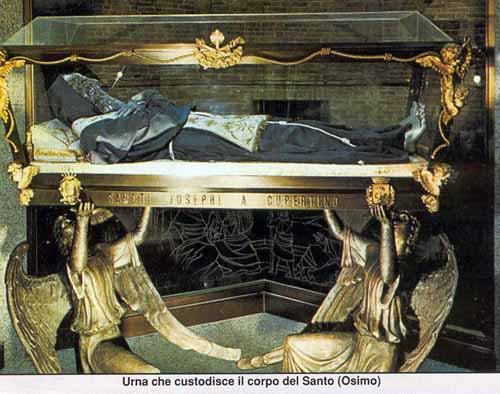
-tomb of St Joseph of Cupertino, Osimo, Italy. Notice, please, how the angels hold aloft his sarcophagus.
Love,
Matthew
Sep 26 – St Marie-Victoire Therese Couderc, r.c., (1805-1885), Foundress of the Congregation of Our Lady of the Retreat of the Cenacle
“God always gives more than we ask.” -Saint Marie-Victoire Therese Couderc
I have been on retreat more than once at The Cenacle in Lincoln Park in Chicago, www.cenaclesisters.org/chicago/. Of course my first question, as would almost anyone’s would be, “What’s a cenacle?”
The Cenacle, from Latin “cenaculum”, also known as the “Upper Room”, is the site of The Last Supper. The word is a derivative of the Latin word “cena”, which means “dinner”. In Christian tradition, based on Acts 1:13(& 14), “When they arrived, they went upstairs to the room where they were staying. Those present were Peter, John, James and Andrew; Philip and Thomas, Bartholomew and Matthew; James son of Alphaeus and Simon the Zealot, and Judas son of James. They all joined together constantly in prayer, along with the women and Mary the mother of Jesus, and with his brothers.”
The “Upper Room” was not only the site of the Last Supper (i.e. the
Cenacle), but also the usual place where the Apostles stayed in Jerusalem, sometimes thought of as the first Christian church. Thus the Cenacle is considered the site where many other events described in the New Testament took place, such as:
- the Washing of the Feet by the Lord of the Apostles
- some Resurrection appearances of Jesus
- the gathering of the disciples after the Ascension of Jesus
- the election of Saint Matthias as apostle
- the descent of the Holy Spirit upon the disciples on the day of Pentecost
Not a bad place for a retreat? Huh? 🙂
Marie-Victoire Couderc was born in 1805 in Le Mas (Ardèche),
France. She made her novitiate with the Sisters of St. Regis in Lalouvesc (Ardèche) in 1825, taking the religious name Therese.
Concerned with welfare of female pilgrims visiting the shrine of St. John Francis Regis, SJ, in town, she co-founded the Sisters of the Cenacle with Father Jean-Pierre Etienne Terme in 1826. It was a response to the disruption and reawakening of the practice of the Faith in France due to the Revolution
St Therese became the Congregation’s founder Superior in 1828, and when the Mother House was established, its Superior General until 1838. The retreats increased rapidly and plans were made to build a new chapel and a new convent. But, after completion, the promised funding evaporated. The bishop of Viviers too quickly lost his trust in Therese, reinforcing Mother Therese’s own humble but mistaken conviction that she was to blame for the debacle. At last, she resigned her office of superior. She was thirty-three years old, having guided her sisters for the first ten years of the congregation’s existence.
Her successor, chosen by the Jesuit provincial, was Mademoiselle Gallet, a wealthy widow only 20 years old, who had been a novice for only 15 days, having entered on September 24, 1838, who hardly knew the first thing about being a nun, put the convent through a terrible trial. She made the rules more lax, Mother Therese had always insisted on silence and evangelical poverty, and borrowed money to buy beautiful things for the convent. Many nuns and outsiders were shocked at this new turn of events, but Our Lady was watching out for the little community.
When mademoiselle died later that year, she left her fortune to the
congregation. However, her relatives contested her will, and the
Cenacle’s financial situation was once more thrown into disarray. The Bishop of Viviers named Countess de la Villeurnoy the new Superior general. Soon, she even began to call herself “mother founder.”
The community of nuns as well as outside friends blamed Mother Thérèse for the whole affair. Rumors began to circulate. “They say that Therese is incompetent and has no business ability whatsoever. How can we count on her to raise funds for the congregation if she is going to fail like this? And her health is reported to be failing badly; perhaps she is no longer capable of governing. It is possible that she has mental problems.”
“It seems that no one can govern this congregation,” he began. “You
yourself resigned your office in disgrace, and this Countess has led you all to the brink of disaster. Now it falls to me to pick up the pieces.
Tell me: should I assign a new superior? Would it help this congregation function better?”
Mother Therese remained silent for a moment. “Fr Renault,” she said
carefully, “You know that I am a professed religious, and that I have taken a vow of obedience to my superiors for life. To me, that obedience means that I must respect every action of my superiors, whether it appeals to me or not. God has placed Mother de la Villeurnoy in a position of authority over me; you seek testimony which I cannot give nor do I wish to give.”
The provincial was dumbfounded. “But this woman calls herself the founder! She has stolen the respect that is rightfully yours!” he burst out.
“Perhaps,” Mother Therese said quietly. “But more important than any title is the vow which I have made to my Creator and Redeemer.”
Nevertheless, the provincial did not need her testimony; there was more than enough evidence against the Countess. After causing eleven months of havoc, the Countess was removed from office.
Mother Contenet, her replacement, eager to attract members of the higher social classes for the congregation, expelled ten of the original twelve members of the congregation. Convinced of the ineptitude of the true founder, she did everything in her power to keep Mother Therese away from the other sisters. Therese was exiled from her chosen work of giving retreats to spend thirteen years at the most difficult manual labor in the congregation, working in the gardens and the cellar. Conditions were so poor that her eyesight was permanently impaired. Her food was only the worst of the vegetables and the unwanted remnants of black bread which the gardener threw alongside the convent wall.
Mother Therese dropped into increasing obscurity. “After all,” she
reflected, “the religious life is a sufficiently great grace even though one purchase it at the price of the most difficult of sacrifices.” Despite the great mortification of her state, she told the young religious that “We should never allow even one thought of sadness to enter the soul. Have we not within us Him who is the joy of Heaven!”
Mother Therese’s exile ended with the death of Mother Contenet in 1852, but dissension and instability once more returned to the Cenacle. Mother Anaïs was elected the new superior general, but left the congregation three years later. Not until 1856 did Therese return to an active role in the congregation.
During a time of crisis, Mother Therese was sent briefly to serve as temporary superior of the convent in Paris and then at Tournon, where her governance was remembered for its firmness but genuine goodness. Again, however, she disappeared into the background.
One day, while visiting one of the convents of the Religious of the
Cenacle, Cardinal Lavigerie noticed Mother Therese praying in the chapel. He turned to the superior of the house and asked, “Anyone can see how holy the face of this sister is. What is her name?”
“Sister Therese Couderc,” was the reply.
“She seems such a saint,” he mused. “What is her place in the history of the congregation?”
The superior was embarrassed. “Well, she was in charge of the gardens for many years, and she was sent to be a temporary superior at two houses in the 1850’s. Now she just mostly prays in the chapel, and we let her alone.”
Cardinal Lavigerie looked at her sharply. “She has been left out, hasn’t she?” The superior said nothing.
Her reputation had been by now so thoroughly maligned by her superiors that even her status as founder had been completely forgotten. Her work as founder had been, above all, her prayers, penances, and humiliation. It was only towards the end of her life, when the bishop of Viviers launched an inquiry into the circumstances of the foundation, that Mother Therese Couderc was finally recognized as the founder of the Sisters of the Cenacle. Fra Angelico’s “The Mocking of Christ” comes to mind.
Mother Thérèse spent many years at the convent in Fourvière, being in charge of the manual labour. She describes some of these trying times…..“We gathered up pieces of black bread which a man used to throw beside the convent wall. At night and early morning we had only one lamp in the hall to give us light to dress by and we had very poor light to work by at recreation.”
Therese told the younger nuns, “Great trials make great souls
and fit them for the great things which God wishes to do through them…Let us say bravely and confidently: God is sufficient for me!…We should never allow even one thought of sadness to enter the soul, because we have within us, Jesus, the Joy of Heaven!”
In 1864, God made Therese understand that souls would not do enough prayer and penance. She wanted to save souls and she firmly believed in self-surrender. Mother Thérèse said, “There is sweetness and peace when one gives himself totally to God, and by doing this, the soul finds Heaven on earth!”
Mother Thérèse spent the last ten years of her life in much suffering of body and soul. In 1875, she offered herself to Our Lord as a victim soul. Day after day, but especially on Thursdays and Fridays, she shared Our Lord’s Agony in the Garden of Gethsemane. She would stay in the chapel near the altar and weep for hours on end, saying over and over, “Have pity on me Dear Lord, have pity on me!”
Her sufferings increased and by 1885, Mother Thérèse had to stay in her. In her pains she suffered patiently and suffered with great peace of. It is reported by a contemporary biographer, Mother Therese stated that the Poor Souls in Purgatory would often come to visit her and they would sing with great love and humility, the “Te Deum.” On September 26, 1885, Mother Thérèse died, closing her eyes to this world. Like a number of founders and foundresses, she later was honored for her sanctity. She died in Lyon at age 80 and is buried in Lalouvesc.
———————-
The modern day sisters of the the Cenacle, 1500 members in sixteen countries, possess a compelling love for Jesus Christ and try to find the best means of making Him better known and loved through their ministry of spiritual direction, personal, private, Ignatian, and directed retreats, particularly in the retreat centers they administer. By membership in their Congregation they give their word to God and each other to continue their search to live the Gospel in the society of today. Not a bad promise to make, IMHO.
During your retreat, you may request a Cenacle sister as a spiritual companion. The Irish have the expression Kelly and I have inscribed on the inside of our wedding rings, “Anam Cara”=”soul friend”. A Cenacle sister, if requested, may, as a trained and experienced spiritual companion, support you in:
- Exploring the “desires of your heart” by talking about your life and your relationship with God.
- Encouraging you in your prayer.
Becoming aware of God’s action in the events of your life and your inner journey. - Reverencing and savoring your experience of God.
- Listening to the deepest desires of your heart.
- Trusting in the Holy Spirit to help you find within yourself the answers to your deep questions.
- Discerning a direction for your life that is in harmony with God’s dream for you.
For me, prayer is like breathing. I absolutely need it. I depend on upon it. Nothing works without it. It must be first. It has become more intense with time and graces received. To rest, completely. To be refreshed, wonderfully. Relationships are very important, we all realize, especially that One. Why should its deepening be any different than our deepening with others, in time spent together, speaking tenderly, lovingly with one another? With Him?
———————-
“I have just one desire, that God be glorified.”
-Saint Marie Victoire Therese Couderc
“My heart embraces the whole world.”
-Saint Marie Victoire Therese Couderc
“Let me live by love, let me die of love, and let my last heartbeat be an act of the most perfect love.”
-Saint Marie Victoire Therese Couderc
“All places are alike to me, because everywhere I expect to find God, who is the only object of all my desires.”
-Saint Marie Victoire Therese Couderc
“What does it matter if my feet, bare and torn, fill my wooden shoes with blood? I would willingly begin the journey all over again, for I have indeed found the good God!”
-Saint Marie Victoire Therese Couderc
“I abandon myself with my whole heart to God’s will, and to God’s good pleasure — and when I have in all sincerity made this act of
self-surrender, I experience great tranquility and perfect peace.” –Saint Marie Victoire Therese Couderc
“I could say, with you, that my heart doesn’t age in this matter of loving others…. We know well we have the same heart we had earlier; it always knows how to love God first and then others in [God]….” –Saint Marie Victoire Therese Couderc
“I saw written as in letters of gold this word Goodness, which I repeated for a long while with an indescribable sweetness. I saw it, I say, written on all creatures, animate and inanimate, rational or not, all bore this name of goodness. I saw it even on the chair I was using as a kneeler. I understood then that all that these creatures have of good and all the services and helps that we receive from each of them is a blessing that we owe to the goodness of our God, who has communicated to them something of his infinite goodness, so that we may meet it in every thing and everywhere.” -Saint Marie Victoire Therese Couderc
“I was preparing to begin my meditation, when I heard the pealing of the church bells calling the faithful to attend the divine Mysteries. At that moment the desire came over me to unite myself with all the Masses which were being said, and to that end I directed my intention so that I might participate in them.
Then I had an overall view of the whole Catholic world and a multitude of altars upon which at one and the same time the adorable Victim was being immolated. The blood of the Lamb without stain was flowing abundantly over every one of these altars, which seemed to be surrounded by a light cloud of smoke ascending toward heaven. My soul was seized and penetrated with a feeling of love and gratitude on beholding this most abundant satisfaction that Our Lord was offering for us.
But I was also greatly astonished that the whole world was not sanctified by it. I asked how it could be that the sacrifice of the Cross having been offered only once was sufficient to redeem all souls, while now being renewed so often it was not sufficient to sanctify them all.
This is the answer I thought I heard: The sacrifice is without any doubt sufficient by itself, and the Blood of Jesus Christ more than sufficient for the sanctification of a million worlds, but souls fail to correspond, they are not generous enough. Now the great means by which one may enter into the path of perfection and of holiness is to SURRENDER ONESELF to our good God.
But what does it mean to SURRENDER ONESELF?
I understand the full extent of the expression TO SURRENDER ONESELF, but I cannot explain it. I only know that it is very vast, that it embraces both the present and the future.
TO SURRENDER ONESELF is more than to devote oneself, more than to give oneself, it is even something more than to abandon oneself to God. In a word, to SURRENDER ONESELF is to die to everything and to self, to be no longer concerned with self except to keep it continually turned toward God.
TO SURRENDER ONESELF is, moreover, no longer to seek oneself in anything, either for the spiritual or the physical, that is to say, no longer to seek one’s own satisfaction, but solely the divine good pleasure.
It should be added that to SURRENDER ONESELF is also to follow that spirit of detachment which clings to nothing, neither to persons nor to things, neither to time nor to place. It means to adhere to everything, to accept everything, to submit to everything.
But perhaps you will think that this is very difficult to do. Do not let yourself be deceived. There is nothing so easy to do, nothing so sweet to put into practice. The whole thing consists in making a generous act once and for all, saying with all the sincerity of your soul: “My God, I wish to be entirely thine; deign to accept my offering.” And all is said. But from then on, you must take care to keep yourself in this disposition of soul and not to shrink from any of the little sacrifices which can help you advance in virtue. You must always remember that you have SURRENDERED yourself.
I pray to our Lord to give an understanding of this word to all souls desirous of pleasing him and to inspire them to take advantage of so easy a means of sanctification. Oh! If people could just understand ahead of time the sweetness and peace that are savored when nothing is held back from the good God! How he communicates himself to the one who seeks him sincerely and has known how to SURRENDER herself. Let them experience it and they will see that here is found the true happiness they are vainly seeking elsewhere.
The SURRENDERED soul has found paradise on earth, since she enjoys that sweet peace which is part of the happiness of the elect.” –To Surrender Oneself, by Saint Marie Victoire Therese Couderc, 26 June 1864
“Not my will be done, but God’s. That is my favorite prayer which I mean to pray every day as long as there is breath left in me, because it is the one which gives me and leaves me with the greatest peace of soul.”
-letter to Mother Marie Aimee Lautier, 16 Oct 1881
“Surrender myself, that is all I did during this retreat – the good God did all rest.”
-letter to Mother de Larochenegly, 13 Feb 1864
“I abandon myself sincerely to God’s will and good pleasure, and when I have sincerely made this act of abandonment, I am calm and I experience a great peace.”
-letter to Mother de Larochnegly, 25 Nov 1875
I learned the necessary interchangeability of the words “Christian faith” and “surrender to Him” many years ago, in prayer. Not easy, just necessary, required. There is no other way to peace.
Prayer for the intercession of St Therese Couderc
O Good God
We rejoice with St Therese Couderc
To find your goodness all around us
And to know that you desire only good for us.
In your great love,
Grant us the favor we ask
And the grace to receive
With your servant Therese
The gift of Christ-like surrender to God.
Amen.
http://www.youtube.com/watch?v=gTRFUFpV6J4
http://www.youtube.com/watch?v=G-V-rqnyZxI
http://www.youtube.com/watch?v=ieluPY8H6oY
-the Cenacle in Jerusalem
Love,
Matthew
Sep 17- St Hildegard von Bingen, OSB, (1098-1179), Doctor of the Church
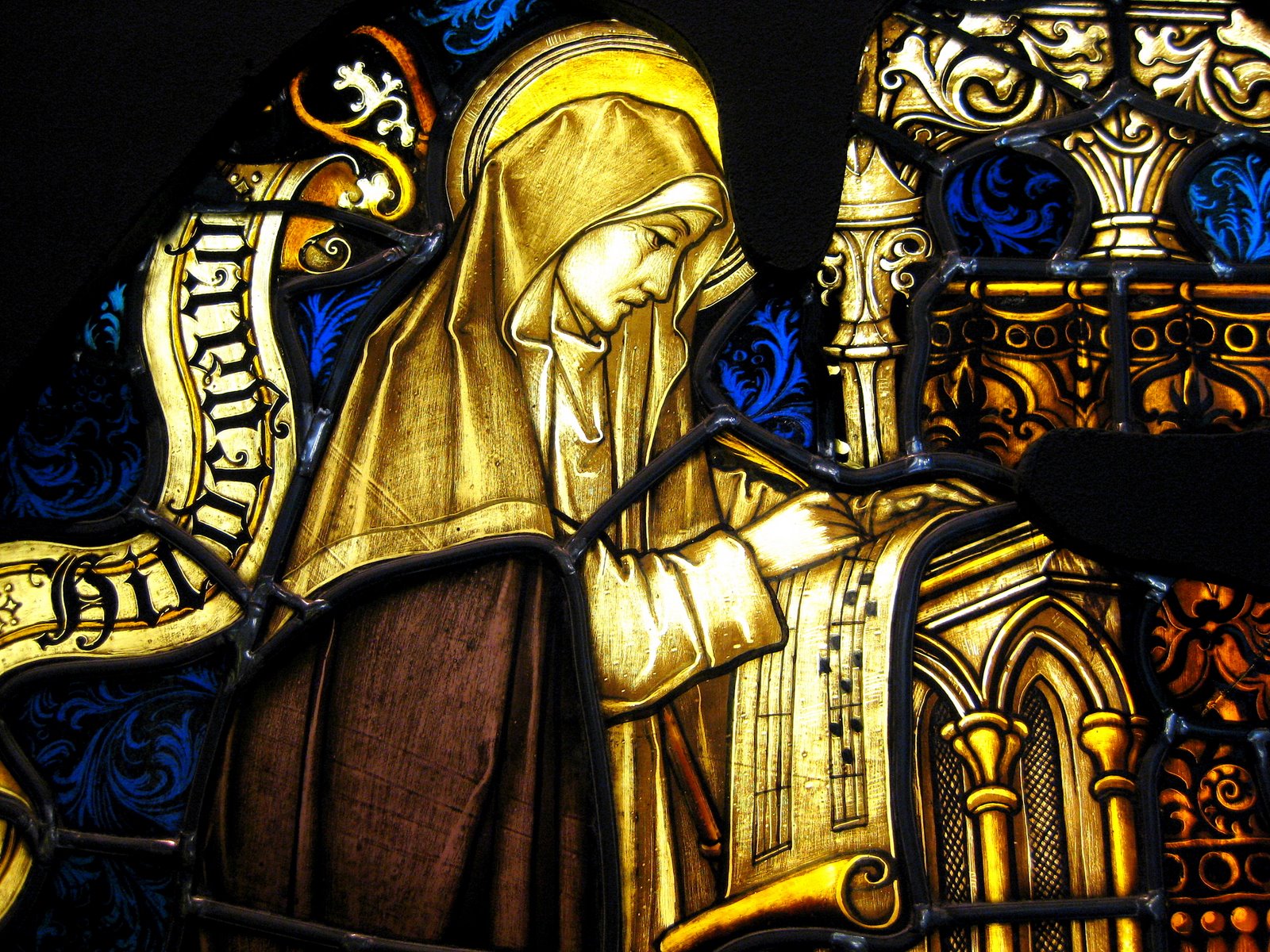
-please click on the image for greater detail
Saint Hildegard of Bingen, O.S.B. (German: Hildegard von Bingen; Latin: Hildegardis Bingensis) (1098 – 17 September 1179), also known as Saint Hildegard, and “Sibyl of the Rhine”, was a German writer, composer, philosopher, Christian mystic, Benedictine abbess, visionary, and polymath. Elected a magistra by her fellow nuns in 1136, she founded the monasteries of Rupertsberg in 1150 and Eibingen in 1165. One of her works as a composer, the Ordo Virtutum, is an early example of liturgical drama and arguably the oldest surviving morality play. She wrote theological, botanical and medicinal texts, as well as letters, liturgical songs, and poems, while supervising brilliant miniature Illuminations.
On 10 May 2012, Pope Benedict XVI extended the liturgical cult of St. Hildegard to the universal Church, in a process known as “equivalent canonization”. On 27 May 2012, the Pope announced that, on 7 October 2012, he will declare St. Hildegard to be the 35th Doctor of the Church.
Hildegard’s date of birth is uncertain. It has been concluded that she may have been born in the year 1098. Hildegard was raised in a family of free nobles. She was her parents’ tenth child, sickly from birth. In her “Vita”, or brief biography often written for saints, Hildegard explains that from a very young age she had experienced visions.
Perhaps due to Hildegard’s visions, or as a method of political positioning, Hildegard’s parents, Hildebert and Mechthilde, offered her as an oblate to the church; their “tithe” to the Church. The date of Hildegard’s enclosure in the church is contentious. Her Vita tells us she was enclosed with an older nun, Jutta, at the age of eight. However, Jutta’s enclosure date is known to be in 1112, at which time Hildegard would have been fourteen. Some scholars speculate that Hildegard was placed in the care of Jutta, the daughter of Count Stephan II of Sponheim, at the age of eight, before the two women were enclosed together six years later. There is no written record of the twenty-four years of Hildegard’s life that she was in the convent together with Jutta. It is possible that Hildegard could have been a chantress and a worker in the herbarium and infirmary.
In any case, Hildegard and Jutta were enclosed at Disibodenberg in the Palatinate Forest in what is now Germany. Jutta was also a visionary and thus attracted many followers who came to visit her at the enclosure. Hildegard also tells us that Jutta taught her to read and write, but that she was unlearned and therefore incapable of teaching Hildegard Biblical interpretation. Hildegard and Jutta most likely prayed, meditated, read scriptures such as the psalter, and did some sort of handwork during the hours of the Divine Office. This also might have been a time when Hildegard learned how to play the ten-stringed psaltery. Volmar, a frequent visitor, may have taught Hildegard simple psalm notation. The time she studied music could also have been the beginning of the compositions she would later create. Upon Jutta’s death in 1136, Hildegard was unanimously elected as “magistra” of the community by her fellow nuns.
With regard to her visions, Hildegard says that she first saw “The Shade of the Living Light” at the age of three, and by the age of five she began to understand that she was experiencing visions. She used the term ‘visio’ to this feature of her experience, and recognized that it was a gift that she could not explain to others. Hildegard explained that she saw all things in the light of God through the five senses: sight, hearing, taste, smell, and touch. Hildegard was hesitant to share her visions, confiding only to Jutta, who in turn told Volmar, Hildegard’s tutor and, later, secretary.
Throughout her life, she continued to have many visions, and in 1141, at the age of 42, Hildegard received a vision she believed to be an instruction from God, to “write down that which you see and hear.” Still hesitant to record her visions, Hildegard became physically ill. The illustrations recorded in the book of “Scivias” were visions that Hildegard experienced, causing her great suffering and tribulations. In her first theological text, “Scivias” (“Know the Ways”), Hildegard describes her struggle within:
“But I, though I saw and heard these things, refused to write for a long time through doubt and bad opinion and the diversity of human words, not with stubbornness but in the exercise of humility, until, laid low by the scourge of God, I fell upon a bed of sickness; then, compelled at last by many illnesses, and by the witness of a certain noble maiden of good conduct [the nun Richardis von Stade] and of that man whom I had secretly sought and found, as mentioned above, I set my hand to the writing. While I was doing it, I sensed, as I mentioned before, the deep profundity of scriptural exposition; and, raising myself from illness by the strength I received, I brought this work to a close – though just barely – in ten years…And I spoke and wrote these things not by the invention of my heart or that of any other person, but as by the secret mysteries of God I heard and received them in the heavenly places. And again I heard a voice from Heaven saying to me, ‘Cry out therefore, and write thus’
Hildegard’s Vita was begun by Godfrey of Disibodenberg under Hildegard’s supervision. It was between November 1147 and February 1148 at the synod in Trier that Pope Eugenus heard about Hildegard’s writings. It was from this that she received Papal approval to document her visions as revelations from the Holy Spirit giving her instant credence.
Before Hildegard’s death, a problem arose with the clergy of Mainz. A man buried at the convent in Rupertsburg had died after excommunication from the Church. Hildegard saw to it the man had received the last rites. But, the clergy wanted to remove his body from the sacred ground. Hildegard did not accept this idea, replying that it was a sin and that the man had been reconciled to the Church at the time of his death. She claimed she’d received word from God allowing the burial. But her ecclesiastical superiors intervened, and ordered the body exhumed. Hildegard defied the authorities by hiding the grave, and the authorities excommunicated the entire convent community. Most insultingly to Hildegard, the interdict prohibited the community from singing. She complied with the interdict, avoiding singing and communion, but did not comply with the command to exhume the corpse. Hildegard appealed the decision to yet higher Church authorities, and finally had the interdict lifted.
On 17 September 1179, when Hildegard died, her sisters claimed they saw two streams of light appear in the skies and cross over the room where she was dying.
Hildegard’s musical, literary, and scientific writings are housed primarily in two manuscripts: the Dendermonde manuscript and the Riesenkodex. The Dendermonde manuscript was copied under Hildegard’s supervision at Rupertsberg, while the Riesencodex was copied in the century after Hildegard’s death.
Attention in recent decades to women of the medieval Church has led to a great deal of popular interest in Hildegard, particularly her music. In addition to the Ordo Virtutum, sixty-nine musical compositions, each with its own original poetic text, survive, and at least four other texts are known, though their musical notation has been lost. This is one of the largest repertoires among medieval composers. Hildegard also wrote nearly 400 letters to correspondents ranging from Popes to Emperors to abbots and abbesses; two volumes of material on natural medicine and cures; an invented language called the Lingua ignota; various minor works, including a gospel commentary and two works of hagiography; and three great volumes of visionary theology: Scivias, Liber vitae meritorum (“Book of Life’s Merits” or “Book of the Rewards of Life”), and Liber divinorum operum (“Book of Divine Works”).
In December 2010, BXVI quoted a long passage from one of Hildegard’s visions to assess the damage done to the church by the sex abuse scandal, and to invite the Vatican hierarchy to accept this “humiliation” as an “an exhortation to truth and a call to renewal”.
“In the vision of St. Hildegard, the face of the church is stained with dust. … Her garment is torn — by the sins of priests. The way she saw and expressed it is the way we have experienced it this year,” the Pope said.
A few months earlier, he had referred to Hildegard to address calls for reform inside the Church, sparked by the “abuses of the clergy.” Benedict recalled how the saint had “harshly reprimanded” those who in her lifetime wanted “radical reform,” reminding them that “true renewal” comes from “repentance” and “conversion, rather than with a change of structures.”
In Hildegard’s lifetime, Pope Eugenius III, who needed help fending off the Cathar heresy that rejected the Church’s worldly power, recognized the authenticity of her visions and authorized her to preach in public — something that Church doctrine had officially forbidden until that time and that nonetheless remains controversial in Catholicism. Hildegard used her unprecedented role to publicly rebuke the emperor and to call on the Pope and bishops to reform the Church’s ills.
In 2006, Benedict XVI himself drew on Hildegard to expound his thinking on women’s role in the Church: not as priests but as bearers of a “spiritual power” that enables them to, yes, even “criticize the bishops.”
In space, she is commemorated by the asteroid 898 Hildegard.
“Listen: there was once a king sitting on his throne. Around him stood great and wonderfully beautiful columns ornamented with ivory, bearing the banners of the king with great honor. Then it pleased the king to raise a small feather from the ground, and he commanded it to fly. The feather flew, not because of anything in itself but because the air bore it along. Thus am I, a feather on the breath of God.” – St Hildegard of Bingen
O leafy branch,
standing in your nobility
as the dawn breaks forth:
now rejoice and be glad
and deign to set us frail ones
free from evil habits
and stretch forth your hand
and lift us up.
-St Hildegard von Bingen
O ruby blood
which flowed from on high
where divinity touched.
You are a flower
that the winter
of the serpent’s breath
can never injure.
-St Hildegard von Bingen
O Shepherd of souls
and o first voice
through whom all creation was summoned,
now to you,
to you may it give pleasure and dignity
to liberate us
from our miseries and languishing.
-St Hildegard von Bingen
O eternal Lord,
it is pleasing to you
to burn in that same fire of love,
like that from which our bodies are born,
and from which you begot your Son
in the first dawn before all of Creation.
So consider this need which falls upon us,
and relieve us of it for the sake of your Son
and lead us in joyous prosperity
-St Hildegard von Bingen
O Great Father we are in great need;
Now therefore we implore, we implore you
Through your Word, by which you have
Filled us with [those things] we need;
Now it may please you Father for it befits you
To consider us with your help,
So that we might not fail and lest your name
Might be blackened in us
And through your name, deign to help us.
-St Hildegard von Bingen
“You are encircled by the arms of the mystery of God.” -St. Hildegard of Bingen
“May the Holy Spirit enkindle you with the fire of His Love so that you may persevere, unfailingly, in the love of His service. Thus you may merit to become, at last, a living stone in the celestial Jerusalem.”
–St. Hildegard von Bingen
Prayer for the intercession of St Hildegard von Bingen:
O God, by Whose grace Thy servant Hildegard, enkindled with the fire of Thy love, became a burning and shining light in Thy Church: Grant that we also may be aflame with the spirit of love and discipline, and may ever walk before Thee as children of light; through Jesus Christ our Lord, Who with Thee, in the unity of the Holy Spirit, liveth and reigneth, one God, now and for ever. Amen.
http://www.youtube.com/watch?v=Q8gK0_PgIgY
In 2009, Zeigeist Films released “Vision”, a film on the life of St Hildegard von Bingen: http://www.imdb.com/title/tt0995850/
Love,
Matthew
Sep 13 – St John Chrysostom, (347-407 AD), Archbishop of Constantinople, Doctor of the Church, Doctor of Preachers, The Real Presence
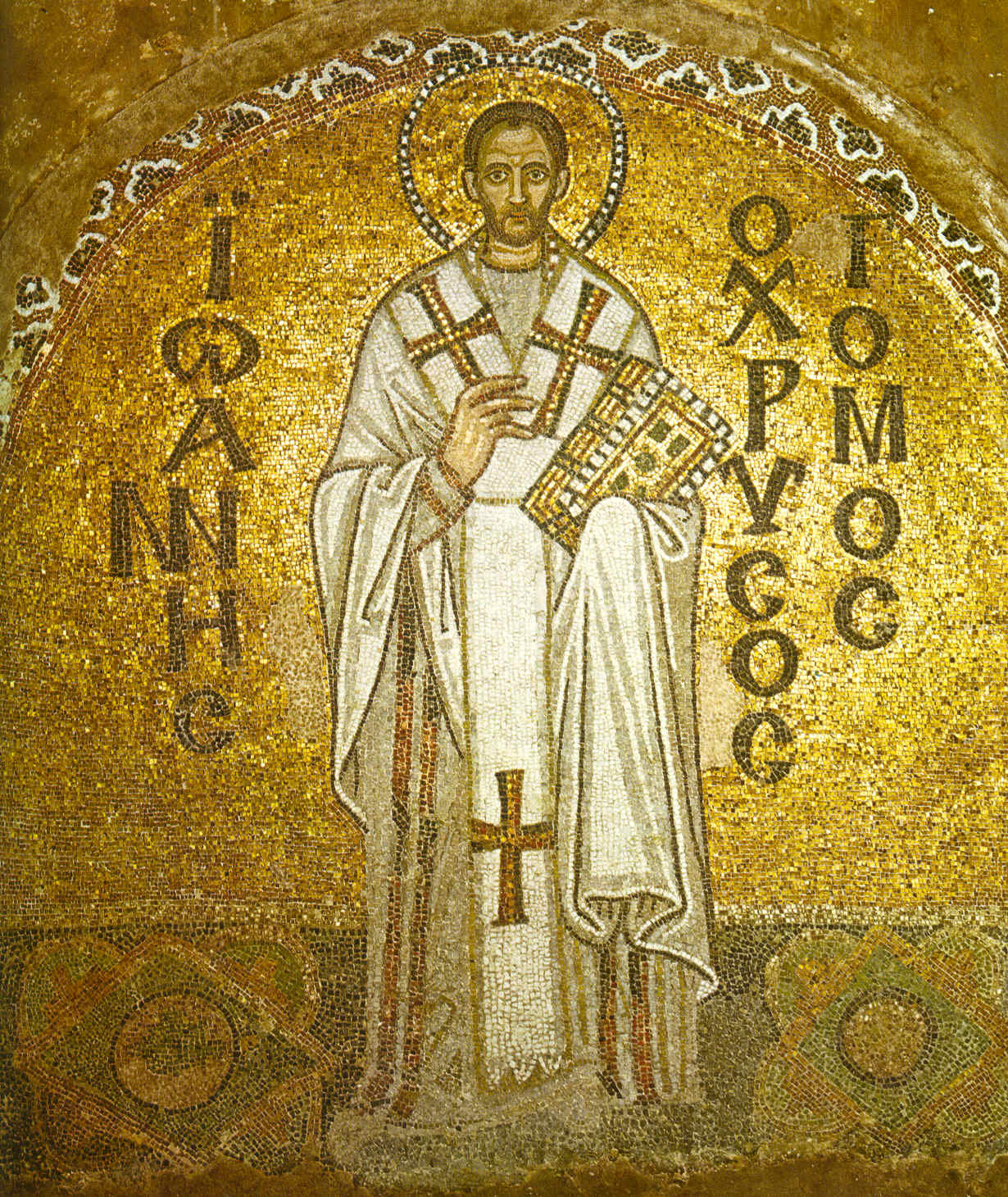
-please click on the image for greater detail
Quick! Name your favorite top ten living great Catholic preachers! Five? One? I trust I make my point. St John Chrysostom was one. Called “Golden-mouthed=Chrysostom”.
For the unlettered and the lettered, one can always recognize holy persons in artwork by universally known symbols in the artwork associated with that personage – iconography. For instance, the artist may have no or there is no universally accepted knowledge of what a person looked like and even among artists across time and distance you will not get a consistent image of the likeness. But, a symbol, such as a honey bee, clearly indicates honey. Right? And when you see a honey bee associated with the image of a man in Catholic art you know they were most likely not canonized for their holy bee keeping skills, but rather the “sweetness of their preaching”, which St Gregory the Great would admonish us is the only proper way of winning hearts and minds for the Lord. One of St John Chrysostom’s identifiable symbols is being depicted in art with honey bees, such was the “sweetness of his preaching”.
The legion of saints of the Church is comprised of people of extraordinary ability whose talents may have been dissimilar but many of whom seem to have shared a common genius for oratory. Yet out of this vast assembly of eloquent speakers, whose reputation might have rested on their gift of expression alone, the one for whom the title “Chrysostom”, or “golden-mouthed” was reserved, was John of Antioch, known as St. John Chrysostom, a great distinction in view of the qualifications of so many others.
Endeared as one of the great doctors of the Church, St. John Chrysostom was born in 347 in Antioch, Syria and was prepared for a career in law under the renowned Libanius, who marveled at his pupil’s eloquence and foresaw a brilliant career for his pupil as statesman and lawgiver. But John decided, after he had been baptised at the age of 23, to abandon the law in favour of service to the Savior. He entered a monastery which served to educate him in preparation for his ordination as a priest in 386 AD. From the pulpit there emerged John, a preacher whose oratorical excellence gained him a reputation throughout the Christian world, a recognition which spurred him to even greater expression that found favour with everyone but the Empress Eudoxia, whom he saw fit to examine in some of his sermons.
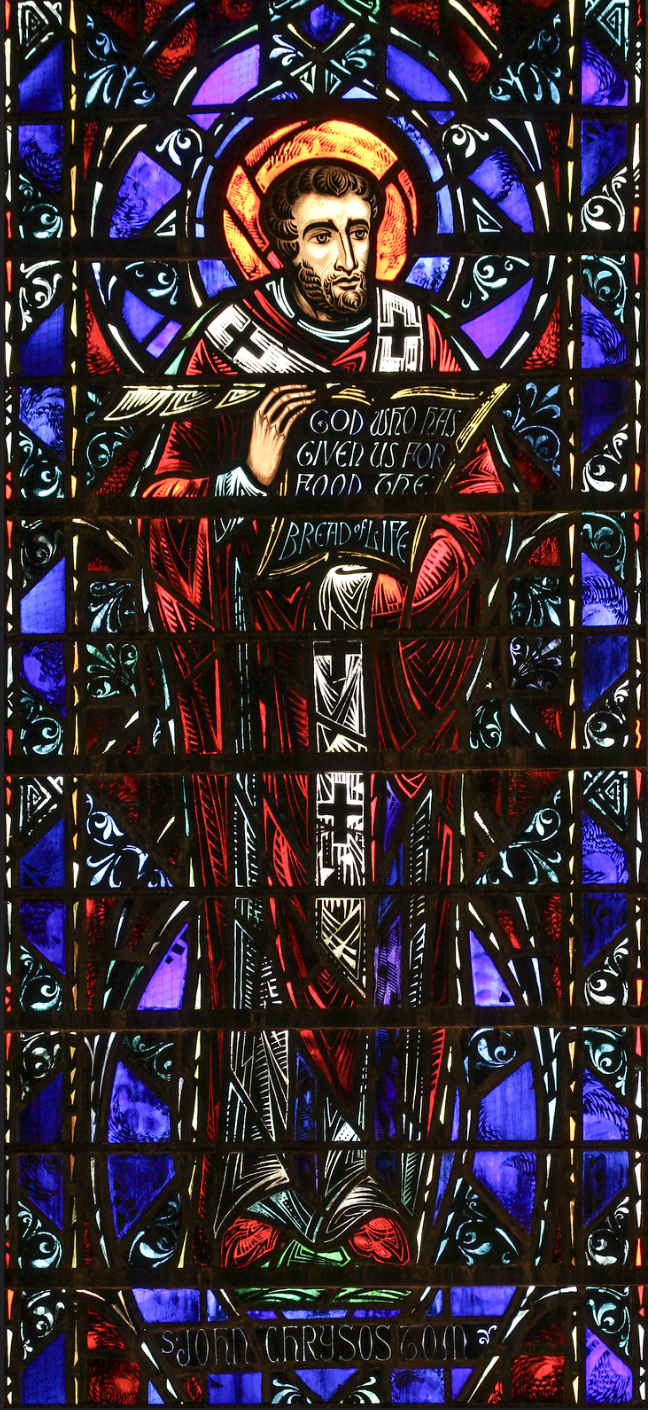
-St John Chrysostom, St Vincent Ferrer Church, NYC
When St. John was forty-nine years old, his immense popularity earned him election to the Patriarchate of Constantinople, a prestigious post from which he launched a crusade against excessiveness and extreme wealth which the Empress construed as a personal affront to her and her royal court. This also gave rise to sinister forces that envied his tremendous influence. His enemies found an instrument for his indictment when they discovered that he had harbored some pious monks who had been excommunicated by his archrival Theophilos, Bishop of Alexandria, who falsely accused John of treason and surreptitiously plotted his exile.
When it was discovered that the great St. John had been exiled by the puppets of the state, there arose such a clamour of protest, promising a real threat of civil disobedience, that not even the royal court dared to confront the angry multitudes and St John was restored to his post. At about this time he put a stop to a practice which was offensive to him, although none of his predecessors outwardly considered it disrespectful; this practice was applauding in church the absence of which some feel adds to the solemnity of Church services.
St. John delivered a sermon in which he deplored the adulation of a frenzied crowd at the unveiling of a public statue of the Empress Eudoxia. His sermon was grossly exaggerated by his enemies, and by the time it reached the ears of the Empress it resulted in his permanent exile from his beloved city of Constantinople. The humiliation of banishment did not deter the gallant, golden-mouthed St. John, who continued to communicate with the Church and wrote his precious prose until he died in the lonely reaches of Pontus on September 14, 407.
The slight, five-foot St. John stood tall in his defiance of state authority, bowing only to God and never yielding the high principles of Christianity to expediency or personal welfare. In the words of his pupil, Cassia of Marseilles, “It would be a great thing to attain his stature, but it would be difficult. Nevertheless, a following of him is lovely and magnificent.”
“When you perceive that God is chastening you, fly not to his enemies…but to his friends, the martyrs, the saints, those who were pleasing to Him, and who have great power in God.” – Saint John Chrysostom, Orations, 396.
“When you are before the altar where Christ reposes, you ought no longer to think that you are amongst men; but believe that there are troops of angels and archangels standing by you, and trembling with respect before the sovereign Master of Heaven and earth. Therefore, when you are in church, be there in silence, fear, and veneration.” – Saint John Chrysostom
“If the Lord should give you power to raise the dead, He would give much less than He does when he bestows suffering. By miracles you would make yourself debtor to Him, while by suffering He may become debtor to you. And even if sufferings had no other reward than being able to bear something for that God who loves you, is not this a great reward and a sufficient remuneration? Whoever loves, understands what I say.” – Saint John Chrysostom
“It is clear through unlearned men that the cross was persuasive; in fact, it persuaded the whole world. Paul had this in mind when he said, “The weakness of God is stronger than men.” That the preaching of these men was indeed divine is brought home to us in the same way. For how otherwise could twelve uneducated men, who lived on lakes and rivers and wastelands, get the idea for such an immense enterprise? How could men who perhaps had never been in a city or public square think of setting out to do battle with the whole world? That they were fearful, timid men, the evangelist makes clear; he did not reject the fact or try to hide their weaknesses. Indeed he turned these into a proof of the truth. What did he say of them? That when Christ was arrested, the others fled, despite all the miracles they had seen, while he who was leader of the others denied him! How then account for the fact that these men, who in Christ’s lifetime did not stand up to the attacks by the Jews, set forth to do battle with the whole world once Christ was dead – if, as you claim, Christ did not rise and speak to them and rouse their courage? It is evident, then, that if they had not seen him risen and had proof of his power, they would not have risked so much.” – from a homily by Saint John Chrysostom on the first letter to the Corinthians.
“O envious one, you injure yourself more than he whom you would injure, and the sword with which you wound will recoil and wound yourself. What harm did Cain do to Abel? Contrary to his intention he did him the greatest good, for he caused him to pass to a better and a blessed life, and he himself was plunged into an abyss of woe. In what did Esau injure Jacob? Did not his envy prevent him from being enriched in the place in which he lived; and, losing the inheritance and the blessing of his father, did he not die a miserable death? What harm did the brothers of Joseph do to Joseph, whose envy went so far as to wish to shed his blood? Were they not driven to the last extremity, and well-nigh perishing with hunger, whilst their brother reigned all through Egypt? It is ever thus; the more you envy your brother, the greater good you confer upon him. God, who sees all, takes the cause of the innocent in hand, and, irritated by the injury you inflict, deigns to raise up him whom you wish to lower, and will punish you to the full extent of your crime. If God usually punishes those who rejoice at the misfortunes of their enemies, how much more will He punish those who, excited by envy, seek to do an injury to those who have never injured them?” – Saint John Chrysostom.
“To commit a murder, besides the not having the person in your power, there are many measures and precautions to take. A favorable opportunity must be waited for, and a place must be selected before we can put so damnable a design into execution. More than this, the pistols may miss fire, blows may not be sufficient, and all wounds are not mortal. But to deprive a man of his reputation and honor, one word is sufficient. By finding out the most sensitive part of his honor, you may tarnish his reputation by telling it to all who know him, and easily take away his character for honor and integrity. To do this, however, no time is required, for scarcely have you complacently cherished the wish to calumniate him, than the sin is effected.” – Saint John Chrysostom
“There is nothing to be dreaded in human ills except sin—not poverty, or disease, or insult, or ill treatment, or dishonor, or death, which people call the worst of evils. To those who love spiritual wisdom, these things are only the names of disasters, names that have no substance. No, the true disaster is to offend God, to do anything that displeases him.”
— St. John Chrysostom, p. 334, A Year with the Church Fathers
“I beseech you, my brothers, to be ever on your guard against the habit of swearing and blaspheming. If a slave dare to pronounce the name of his master, he does it but seldom, and then only with respect; therefore is it not a shocking impiety to speak with contempt and irreverence of the name of the Master of angels and seraphim? People handle the book of the Gospel with a religious fear, and then only with clean hands, and yet your rash tongue would inconsiderately profane the name of the Divine Author of the Gospel. Would you wish to know with what respect, fear, and wonder the choirs of the angels pronounce the adorable name? Listen to the prophet Isaiah: ” I saw,” says Isaiah, “the Lord sitting upon a throne high and elevated; upon it stood the seraphim, who cried one to another and said, Holy, holy, holy, the Lord God of hosts, all the earth is full of His glory.” See with what terror they are seized, even while they praise and glorify Him. As for you, my brethren, you know how cold and indifferent are the prayers you say, and you know how frequently you blaspheme a name so majestic, so sacred, and how you try to make excuses for the bad habit you have contracted. It is easy, yes, I say, it is easy, with a little care, attention, and reflection, to leave off this vicious habit. Since we have fallen, my brethren, into this sin of blasphemy, I conjure you, in the name of our Lord, to rebuke openly these blasphemers. When you meet with such who publicly sin in this respect, correct them by word of mouth, and, if necessary, by your strong arm. Let these shameless swearers be covered with confusion. You could not employ your hand to a holier work. And if you are given into custody, go boldly before the magistrate, and say in your defense that you have avenged a blasphemy. For if a person is punished for speaking contemptuously of a prince, is it not reasonable to suppose that a person who speaks irreverently of God should be sentenced to a severer punishment? It is a public crime, a common injury which all the world ought to condemn. Let the Jews and infidels see that our magistrates are Christians, and that they will not allow those to go unpunished who insult and outrage their Master. Do you remember that it was a false oath that overturned the houses, temples, and walls of Jerusalem, and from a superb city it became a mass of ruins? Neither the sacred vessels nor the sanctuary could stay the vengeance of a God justly angered against a violater of His word. Sedecias did not receive a more favored treatment than Jerusalem. Flight did not save him from his enemies. This prince, escaping secretly, was pursued and taken by the Assyrians, who led him to their king. The king, after asking him the reason of his perfidy, not only caused his children to be killed, but deprived him of his sight, and sent him back to Babylon, loaded with iron chains. Would you know the reason why? It was that the barbarians and Jews who inhabited the country adjoining Persia should know, by this terrible example, that the breach of an oath is punishable.” – Saint John Chrysostom, from the Seventh Homily.
“If any man be devout and love God, let him enjoy this fair and radiant triumphal feast. If any man be a wise servant, let him rejoicing enter into the joy of his Lord. If any have labored long in fasting, let him now receive his recompense. If any have wrought from the first hour, let him today receive his just reward. If any have come at the third hour, let him with thankfulness keep the feast. If any have arrived at the sixth hour, let him have no misgivings; because he shall in nowise be deprived therefor. If any have delayed until the ninth hour, let him draw near, fearing nothing. If any have tarried even until the eleventh hour, let him, also, be not alarmed at his tardiness; for the Lord, who is jealous of his honor, will accept the last even as the first; he gives rest unto him who comes at the eleventh hour, even as unto him who has wrought from the first hour.
And he shows mercy upon the last, and cares for the first; and to the one he gives, and upon the other he bestows gifts. And he both accepts the deeds, and welcomes the intention, and honors the acts and praises the offering. Wherefore, enter you all into the joy of your Lord; and receive your reward, both the first, and likewise the second. You rich and poor together, hold high festival. You sober and you heedless, honor the day. Rejoice today, both you who have fasted and you who have disregarded the fast. The table is full-laden; feast ye all sumptuously. The calf is fatted; let no one go hungry away.
Enjoy ye all the feast of faith: Receive ye all the riches of loving-kindness. Let no one bewail his poverty, for the universal kingdom has been revealed. Let no one weep for his iniquities, for pardon has shown forth from the grave. Let no one fear death, for the Savior’s death has set us free. He that was held prisoner of it has annihilated it. By descending into Hell, He made Hell captive. He embittered it when it tasted of His flesh. And Isaiah, foretelling this, did cry: Hell, said he, was embittered, when it encountered Thee in the lower regions. It was embittered, for it was abolished. It was embittered, for it was mocked. It was embittered, for it was slain. It was embittered, for it was overthrown. It was embittered, for it was fettered in chains. It took a body, and met God face to face. It took earth, and encountered Heaven. It took that which was seen, and fell upon the unseen.
O Death, where is your sting? O Hell, where is your victory? Christ is risen, and you are overthrown. Christ is risen, and the demons are fallen. Christ is risen, and the angels rejoice. Christ is risen, and life reigns. Christ is risen, and not one dead remains in the grave. For Christ, being risen from the dead, is become the first fruits of those who have fallen asleep. To Him be glory and dominion unto ages of ages. Amen.” -The Paschal (Easter) Sermon of St. John Chrysostom
O my all-merciful God and Lord, Jesus Christ, full of pity:
Through Your great love You came down
and became incarnate in order to save everyone.
O Savior, I ask You to save me by Your grace!
If You save anyone because of their works,
that would not be grace but only reward of duty,
but You are compassionate and full of mercy!
You said, O my Christ,
“Whoever believes in Me shall live and never die.”
If then, faith in You saves the lost, then save me,
O my God and Creator, for I believe.
Let faith and not my unworthy works be counted to me, O my God,
for You will find no works which could account me righteous.
O Lord, from now on let me love You as intensely as I have loved sin,
and work for You as hard as I once worked for the evil one.
I promise that I will work to do Your will,
my Lord and God, Jesus Christ, all the days of my life and forever more. -St John Chrysostom

-eucharistic miracle of Santarem, Portugal
“How many of you say:
I should like to see His face,
His garments, His shoes.
You do see Him, you touch Him,
you eat Him. He gives Himself to you,
not only that you may see Him, but also
to be your food and nourishment.”
—St. John Chrysostom
Troparion to St. John (Tone 8)
“Grace like a flame shining forth from thy mouth has illumined the universe, and disclosed to the world treasures of poverty and shown us the height of humility. And as by thine own words thou teachest us, Father John Chrysostom, so intercede with the Word, Christ our God, to save our souls.”
“Prayer is the place of refuge for every worry, a foundation for cheerfulness, a source of constant happiness, a protection against sadness.” -St. John Chrysostom
“The road to Hell is paved with the skulls of erring priests, with bishops as their signposts” – St. John Chrysostom
“All seek joy, but it is not found on earth.” -St. John Chrysostom
“The cross is our trophy raised against the demons, our sword against sin, and the sword of Christ used to pierce the serpent.”
-St. John Chrysostom
“Riches are not forbidden, but the pride of them is.”
-St. John Chrysostom
“If you cannot find Christ in the beggar at the church door, you will not find Him in the chalice.”
—St. John Chrysostom
“A friend is more to be longed for than the light; I speak of a genuine one. And wonder not: for it were better for us that the sun should be extinguished, than that we should be deprived of friends; better to live in darkness, than to be without friends.”
–St. John Chrysostom
“Mercy imitates God and disappoints Satan.” -St. John Chrysostom
“God asks little, but He gives much.” –St. John Chrysostom
“We must not mind insulting men, if by respecting them we offend God.”
-St. John Chrysostom
“There is nothing colder than a Christian who does not seek to save others.”
— St. John Chrysostom
“What the soul is in the body, let Christians be in the world.” -St. John Chrysostom
“And though every day a man lives may rightly be a day of repentance, yet is it in these days more becoming, more appropriate, to confess our sins, to fast, and to give alms to the poor; since in these days you may wash clean the sins of the whole year.” -St. John Chrysostom
“If we approach with faith, we too will see Jesus … for the Eucharistic table takes the place of the crib. Here the Body of the Lord is present, wrapped not in swaddling clothes but in the rays of the Holy Spirit.”
–St. John Chrysostom
“Happiness can only be achieved by looking inward and learning to enjoy whatever life has, and this requires transforming greed into gratitude.”
–St. John Chrysostom
“God loves us more than a father, mother, friend, or any else could love, and even more than we are able to love ourselves.”
-St. John Chrysostom
“If then we have angels, let us be sober, as though we were in the presence of tutors; for there is a demon present also.”
–St. John Chrysostom
“Helping a person in need is good in itself. But the degree of goodness is hugely affected by the attitude with which it is done. If you show resentment because you are helping the person out of a reluctant sense of duty, then the person may receive your help but may feel awkward and embarrassed. This is because he will feel beholden to you. If, on the other hand, you help the person in a spirit of joy, then the help will be received joyfully. The person will feel neither demeaned nor humiliated by your help, but rather will feel glad to have caused you pleasure by receiving your help. And joy is the appropriate attitude with which to help others because acts of generosity are a source of blessing to the giver as well as the receiver.”
–St. John Chrysostom
“Man threw away everything he had—his right to speak freely, his communion with God, his time in Paradise, his unclouded life—and went out naked, like a survivor from a shipwreck. But God received him and immediately clothed him, and taking him by the hand gradually led him to heaven. And yet the shipwreck was quite unforgivable. For this tempest was entirely due, not to the force of the winds, but to the carelessness of the sailor. Yet God did not look at this, but had compassion for such a great disaster. … Why? Because, when no sadness or care or labor or toil or countless waves of desire assaulted our nature, it was overturned and fell. And just as criminals who sail the sea often drill through the ship with a small iron tool, and let the whole sea into the ship from below, so when the devil saw the ship of Adam (by which I mean his soul) filled with many good things, he came and drilled through it with his voice alone, as if it were an iron tool, and stole all his wealth and sank the ship itself. But God made the gain greater than the loss, and brought our nature to the royal throne.”
—St. John Chrysostom
“I behold a new and wondrous mystery. My ears resound to the Shepherd’s song, piping no soft melody, but chanting full forth a heavenly hymn.”
– St. John Chrysostom
“Even if you do not confess, God is not ignorant of the deed, since he knew it before it was committed. Why then do you not speak of it? Does the transgression become heavier by the confession? No, it becomes lighter and less troublesome. And this is why He wants you to confess: not that you should be punished, but that you should be forgiven; not that He may learn your sin—how could that be, since He has seen it?—but that you may learn what favor He bestows. He wishes you to learn the greatness of His grace, so that you may praise Him perfectly, that you may be slower to sin, that you may be quicker to virtue. And if you do not confess the greatness of the need, you will not understand the enormous magnitude of His grace.”
—St. John Chrysostom
“There is nothing to be dreaded in human ills except sin—not poverty, or disease, or insult, or ill treatment, or dishonor, or death, which people call the worst of evils. To those who love spiritual wisdom, these things are only the names of disasters, names that have no substance. No, the true disaster is to offend God, to do anything that displeases Him.”
—St. John Chrysostom
“The Devil didn’t deal out temptations to Our Lord only. He brings these evil schemes of his to bear on each of Jesus’ servants—and not just on the mountain or in the wilderness or when we’re by ourselves. No, he comes after us in the city as well, in the marketplaces, in courts of justice. He tempts us by means of others, even our own relatives. So what must we do? We must disbelieve him altogether, and close our ears against him, and hate his flattery. And when he tries to tempt us further by offering us even more, then we should shun him all the more. . . We aren’t as intent on gaining our own salvation as he is intent on achieving our ruin. So we must shun him, not with words only, but also with works; not in mind only, but also in deed. We must do none of the things that he approves, for in that way will we do all those things that God approves. Yes, for the Devil also makes many promises, not so that he may give them to us, but so that he may take away from us. He promises plunder, so that he may deprive us of the kingdom of God and of righteousness. He sets out treasures in the earth as snares and traps, so that he may deprive us both of these and of the treasures in heaven. He would have us be rich in this life, so that we may not be rich in the next.”
—St. John Chrysostom
“The fast of Lent has no advantage to us unless it brings about our spiritual renewal. It is necessary while fasting to change our whole life and practice virtue. Turning away from all wickedness means keeping our tongue in check, restraining our anger, avoiding all gossip, lying and swearing. To abstain from these things—herein lies the true value of the fast.”
–St. John Chrysostom
“Let us help one another spiritually. Let us hinder those things that lead our friends away to hell.”
-St. John Chrysostom
“The love of husband and wife is the force that welds society together.”
-St. John Chrysostom
Prayer to Saint John Chrysostom
Dear Saint John, your oratorical gifts inspired thousands and earned you the name “golden-mouthed.” Continue to inspire Christians through your writings and grant us a rebirth of Christian preaching for the spiritual renewal of the Church. Obtain from God preachers like yourself who, animated by the Holy Spirit, deserve to be called other Christs and forcefully preach the Good News. Amen.
Love,
Matthew
Sep 2-3: Blessed John du Lau & Companions, (d. 1792) – Martyrs of September…of Paris…of Carmes
The Benedictines and Carmelites in some places in the USA, and of course in England and France, liturgically remember the September Martyrs, also called the Paris Martyrs; you will also see the memorial listed as “Blessed John du Lau and companions” after the Archbishop of Arles, the highest ranking prelate among the 191 martyrs. The Benedictine nuns of Stanbrook Abbey are connected with the Carmelite nuns and retain some of the relics. Historians tells us that about 1500 clergy and religious were killed in 1792. And this act of martyrdom inspired the writing of Georeges Bernanos’s “Dialogues of the Carmelites” and the famous opera of Francis Poulenc, by the same name.
The French “virtue” of liberty was not applied to the Church. In fact, quite the opposite. Just a few years after the French Revolution there was a purge of high and low clergy, religious and laity. The killing of the clerics happened because the republican government seized control of the Church, a matter that was (and, remains so today) unacceptable to Catholic ecclesiology. As the state has its duty and responsibility for civic order and leadership, the Church’s mandate is found in sacred Scripture, Tradition and the Magisterium and not in positive law; in short all things pertaining to the salvation of souls. Matters of state are not the same for the Church and vice versa unless these matters concern the moral law. This, however, was not the reigning ideology. The Republicans passed legislation that rejected the authority of the Church and it wanted the bishops and priests to uphold the new laws giving the state control over the Church. Something similar had with the Oath of Supremacy in England. Clergyman and religious weren’t the only one to offer their lives as a gift to the Lord. the laity lost their lives too, aristocrats and peasant alike. Refusing to take the oath got you the label: “non-jurors.”
Some of the 191 were killed in cold blood, others were asked a question and depending on how they answered determined if they lived or died. No mental reservation was kept when it came to following the wisdom of the Church or the wisdom of man.
One observer noted that common among those put to death was that all faced death in a happy manner as one who would’ve gone to a wedding. Indeed, the wedding feast the martyrs were going to was the Wedding Feast of the Lamb (see the Book of Revelation).
In 1790, the revolutionary government of France enacted a law denying Papal authority over the Church in France. The French clergy were required to swear an oath to uphold this law and submit to the Republic,the penalty for refusing to take the oath was deportation. Many priests and religious took the oath but a sizable minority opposed it. The revolutionary leaders’ primary target was the aristocracy, but by 1792, their attention turned to the Church, especially the non-jurors within it. In August, in the name of Liberty, Equality and Fraternity, those who had refused the oath were rounded up and imprisoned in Parisian monasteries, emptied for that purpose.
Blessed John du Lau, archbishop of Arles, was born on October 30, 1738 at the Château de la Côte at Biras in the Dordogne, in the diocese of Périgueux, of an aristocratic family which had fed many members into the higher ranks of the clergy. His father was Armand du Lau, seigneur de La Coste and his mother Françoise de Salleton. Refusing to take the oath to the civil constitution, he had been brought to Paris and cast into the prison of the Cannes, formerly a Carmelite monastery, awaiting deportation, as were the rest.
Blessed Pierre-Louis de la Rochefoucauld, Bishop of Saintes and a vigorous antagonist of Jansenism, and his brother, Francois-Joseph de la Rochefoucauld, Bishop of Beauvais, were sons of Jean de La Rochefoucauld, lord of Maumont, Magnac, and other places, knight of the military orders of Notre-Dame du Mont-Carmel and St-Lazarre de Jérusalem, and Marguerite des Escots. Both brothers were imprisoned.
In September “Vigilance Committees” were set up and mobs sent to the make-shift prisons. On 2nd September a season of bloodshed and slaughter began. The inmates were cut-down in cold blood. All of the prisoners, even the old and disabled, were put to the sword. The executions at the old Carmelite monastery in Paris were recorded.
Among the martyrs was Blessed Alexander Lenfant, a Jesuit. Just a few minutes before he died, he had been hearing the confession of a fellow priest. Both were killed moments later. The rioters then went to the Carmelite church which was also being used as a prison.
The mob called out, “Archbishop of Arles!” Archbishop John du Lau of Arles (Jean-Marie du Lau d’Alleman) was praying in the chapel. When summoned, he came out and he said, “I am he whom you seek.” Thereupon, they cracked his skull, stabbed him and trampled him underfoot. Then the leader set up a “tribunal” before which the imprisoned were herded and commanded to take the oath. All refused; so, as they passed down the stairway, they were hacked to pieces by the murderers.
The bishop of Beauvais had earlier been wounded in the leg. When summoned, he answered, “I do not refuse to die with the others, but I cannot walk. I beg you to have the kindness to carry me where you wish me to go.” For a moment, his courtesy silenced the assassins. But, when he, too, refused the oath, he was killed like the rest.
On September 3, the same mob went to the Lazarist (Vincentian) seminary. It was also a temporary prison, with ninety priests and religious. Only four escaped death. According to Nicolas-Edme Restif de la Bretonne, “The number of active killers who took part in the September massacres was only about one hundred and fifty. The rest of Paris looked on in fear or approval, or stayed behind closed shutters.”
Earl Gower, a British diplomat, wrote in his dispatches: “These unfortunate people fell victims to the fury of the enraged populace and were massacred with circumstances of barbarity too shocking to describe. The mob went afterwards to the prison of the Abbaye, and having demanded of the jailors a list of the prisoners they put aside such as were confined only for debt, and pulled to pieces most of the others. The same cruelties were committed during the night and continue this morning in all the other prisons of the town. When they have satiated their vengeance, which is principally directed against the refractory Priests,… it is to be hoped the tumult will subside, but as the multitude are perfectly masters, everything is to be dreaded.”
The massacres continued for most of the year. By the end of September over 200 clergy had been killed and by the end of 1792 the total was 1500. One-hundred and ninety-one September martyrs were beatified by Pope Pius XI in 1926. Long after the names of their blood-thirsty executioners have been forgotten, their heroism in the defense of the Papacy and the Faith will be remembered:
Blessed Jean-Marie du Lau d’Alleman, Archbishop of Arles
Blessed Ambroise-Augustin Chevreux
Blessed Andé Angar
Blessed André Grasset de Saint-Sauveur
Blessed André-Abel Alricy
Blessed Anne-Alexandre-Charles-Marie Lanfant
Blessed Antoine-Charles-Octavien du Bouzet
Blessed Antoine-Mathieu-Augustin Nogier
Blessed Apollinaris of Posat
Blessed Armand de Foucauld de Pontbriand
Blessed Armand-Anne-Auguste-Antonin-Sicaire Chapt de Rastignac
Blessed August-Dénis Nezel
Blessed Bernard-François de Cucsac
Blessed Bertrand-Antoine de Caupenne
Blessed Charles Carnus
Blessed Charles-François le Gué
Blessed Charles-Jéremie Bérauld du Pérou
Blessed Charles-Louis Hurtrel
Blessed Charles-Regis-Mathieu de la Calmette de Valfons (Count of Valfons)
Blessed Charles-Victor Véret
Blessed Claude Bochot
Blessed Claude Cayx-Dumas
Blessed Claude Chaudet
Blessed Claude Colin
Blessed Claude Fontaine
Blessed Claude Ponse
Blessed Claude Rousseau
Blessed Claude-Antoine-Raoul Laporte
Blessed Claude-François Gagnières des Granges
Blessed Apollinaris of Posat
Blessed Claude-Louis Marmotant de Savigny
Blessed Claude-Silvain-Raphaël Mayneaud de Bizefranc
Blessed Daniel-Louis André Des Pommerayes
Blessed Denis-Claude Duval
Blessed Éloy Herque du Roule
Blessed Étienne-François-Dieudonné de Ravinel
Blessed Étienne-Michel Gillet
Blessed Eustache Félix
Blessed François Balmain
Blessed François Dardan
Blessed François Dumasrambaud de Calandelle
Blessed François Lefranc
Blessed François Varheilhe-Duteil
Blessed François-César Londiveau
Blessed François-Hyacinthe lé Livec de Trésurin
Blessed François-Joseph de la Rochefoucald-Maumont, Bishop of Beauvais
Blessed François-Joseph Monnier
Blessed François-Joseph Pey
Blessed François-Louis Hébert
Blessed François-Louis Méallet de Fargues
Blessed François-Urbain Salins de Niart
Blessed Gabriel Desprez de Roche
Blessed Gaspard-Claude Maignien
Blessed Georges Girault
Blessed Georges-Jérôme Giroust
Blessed Gilbert-Jean Fautrel
Blessed Gilles-Louis-Symphorien Lanchon
Blessed Guillaume-Antoine Delfaut
Blessed Guillaume-Nicolas-Louis Leclerq (Salomon), a lay Brother
Blessed Henri-August Luzeau de la Mulonnière
Blessed Henri-Hippolyte Ermès
Blessed Henri-Jean Milet
Blessed Jacques de la Lande
Blessed Jacques Dufour
Blessed Jacques Friteyre-Durvé
Blessed Jacques-Alexandre Menuret
Blessed Jacques-Augustin Robert de Lézardières
Blessed Jacques-Étienne-Philippe Hourrier
Blessed Jacques-François de Lubersac
Blessed Jacques-Gabriel Galais
Blessed Jacques-Jean Lemeunier
Blessed Jacques-Joseph Le jardinier desLandes
Blessed Jacques-Jules Bonnaud
Blessed Jacques-Léonor Rabé
Blessed Jacques-Louis Schmid
Blessed Jean Charton de Millou
Blessed Jean Goizet
Blessed Jean Lacan
Blessed Jean Lemaître
Blessed Jean-André Capeau
Blessed Jean-Antoine Guilleminet
Blessed Jean-Antoine Savine
Blessed Jean-Antoine Seconds
Blessed Jean-Antoine-Barnabé Séguin
Blessed Jean-Antoine-Hyacinthe Boucharenc de Chaumeils
Blessed Jean-Antoine-Joseph de Villette
Blessed Jean-Baptiste Bottex
Blessed Jean-Baptiste Jannin
Blessed Jean-Baptiste Nativelle
Blessed Jean-Baptiste-Claude Aubert
Blessed Jean-Baptiste-Marie Tessier
Blessed Jean-Baptiste-Michel Pontus
Blessed Jean-Charles Caron
Blessed Jean-Charles Legrand
Blessed Jean-Charles-Marie Bernard du Cornillet
Blessed Jean-François Bonnel de Pradal
Blessed Jean-François Bousquet
Blessed Jean-François Burté
Blessed Jean-François-Marie Benoît-Vourlat
Blessed Jean-Henri Gruyer
Blessed Jean-Henri-Louis-Michel Samson
Blessed Jean-Joseph de Lavèze-Bellay
Blessed Jean-Joseph Rateau
Blessed Jean-Louis Guyard de Saint-Clair
Blessed Jean-Michel Philippot
Blessed Jean-Philippe Marchand
Blessed Jean-Pierre Bangue
Blessed Jean-Pierre Duval
Blessed Jean-Pierre Le Laisant
Blessed Jean-Pierre Simon
Blessed Jean-Robert Quéneau
Blessed Jean-Thomas Leroy
Blessed Joseph Bécavin
Blessed Joseph Falcoz
Blessed Joseph-Louis Oviefre
Blessed Joseph-Marie Gros
Blessed Joseph-Thomas Pazery de Thorame
Blessed Jules-Honoré-Cyprien Pazery de Thorame
Blessed Julien le Laisant
Blessed Julien Poulain Delaunay
Blessed Julien-François Hédouin
Blessed Laurent
Blessed Louis Barreau de La Touche
Blessed Louis le Danois
Blessed Louis Longuet
Blessed Louis Mauduit
Blessed Louis-Alexis-Mathias Boubert
Blessed Louis-Benjamin Hurtrel
Blessed Louis-François Rigot
Blessed Louis-François-André Barret
Blessed Louis-Jean-Mathieu Lanier
Blessed Louis-Joseph François
Blessed Louis-Laurent Gaultier
Blessed Louis-Remi Benoist
Blessed Louis-Remi-Nicolas Benoist
>Blessed Loup Thomas-Bonnotte
Blessed Marc-Louis Royer
Blessed Marie-François Mouffle
Blessed Martin-François-Alexis Loublier
Blessed Mathurin-Nicolas de la VilleCrohain le Bous de Villeneuve
Blessed Mathurin-Victoir Deruelle
Blessed Michel Leber
Blessed Michel-André-Sylvestre Binard
Blessed Michel-François de laGardette
Blessed Nicolas Bize
Blessed Nicolas Clairet
Blessed Nicolas Colin
Blessed Nicolas Gaudreau
Blessed Nicolas-Claude Roussel
Blessed Nicolas-Marie Verron
Blessed Olivier Lefebvre
Blessed Philibert Fougères
Blessed Pierre Bonzé
Blessed Pierre Brisquet
Blessed Pierre Brisse
Blessed Pierre Gauguin
Blessed Pierre Landry
Blessed Pierre Ploquin
Blessed Pierre Saint-James
Blessed Pierre-Claude Pottier
Blessed Pierre-Florent Leclercq
Blessed Pierre-François Hénocq
Blessed Pierre-François Pazery de Thorames
Blessed Pierre-Jacques de Turmenyes
Blessed Pierre-Jacques-Marie Vitalis
Blessed Pierre-Jean Garrigues
Blessed Pierre-Louis de la Rochefoucauld-Bayers, Bishop of Saintes
Blessed Pierre-Louis Gervais
Blessed Pierre-Louis Joret
Blessed Pierre-Louis-Joseph Verrier
Blessed Pierre-Michel Guérin
Blessed Pierre-Michel Guérin du Rocher
Blessed Pierre-Nicolas Psalmon
Blessed Pierre-Paul Balzac
Blessed Pierre-Robert Regnet
Blessed René Nativelle
Blessed René-Joseph Urvoy
Blessed René-Julien Massey
Blessed René-Marie Andrieux
Blessed René-Nicolas Poret
Blessed Robert le Bis
Blessed Robert-François Guérin du Rocher
Blessed Saintin Huré
Blessed Sébastien Desbrielles
Blessed Thomas-Jean Montsaint
Blessed Thomas-Nicolas Dubray
Blessed Thomas-René Dubuisson
Blessed Urbain Lefebvre
Blessed Vincent Abraham
Blessed Vincent-Joseph le Rousseau de Rosencoat
Blessed Yves-André Guillon de Keranrun
Blessed Yves-Jean-Pierre Rey de Kervisic
-The Massacre at the Abbaye Prison near St. Germain des Pres, engraved by Reinier Vinkeles and Daniel Vrydag
-The Massacre of the Priests in September 1792 by H. de la Charlerie
All you Holy Martyrs of God, pray for us!
Queen of Martyrs, pray for us!
Love,
Matthew
Sep 9 – St Peter Claver, SJ (1581-1654), Slave of Slaves
I am convinced, in our modern convenience, we forget, willfully, albeit unconsciously, how awful, terrible, and hard reality was at times in the past, or even more recently, mentally distancing ourselves as a means of emotional defense and comfort: Iraq, WWII, pioneers, the Civil War, slavery.
We relegate these visceral memories to colorful pages in a history book or, now, online. But, these, currently, and at one time, were reality. The story of St Peter Claver begins to show me so.
A native of Spain, young Jesuit Peter Claver left his homeland forever in 1610 to be a missionary in the colonies of the New World. He sailed into Cartagena (now in Colombia), a rich port city washed by the Caribbean. He was ordained there in 1615.
By this time the slave trade had been established in the Americas for nearly 100 years, and Cartagena was a chief center for it. Criminals, war captives, the mentally unstable, the sick and various social misfits were bartered to the white traders by the African chiefs. Others were captured at random, especially able-bodied males and females deemed suitable for labor.
Ten thousand slaves poured into the port each year after crossing the Atlantic from West Africa under conditions so foul and inhuman that an estimated one-third of the passengers died in transit. Although the practice of slave-trading was condemned by Pope Paul III and later labeled “supreme villainy” by Pius IX, it continued to flourish.
Peter Claver’s predecessor, Jesuit Father Alfonso de Sandoval, had devoted himself to the service of the slaves for 40 years before Claver arrived to continue his work, declaring himself “the slave of the Negroes forever.”
As soon as a slave ship entered the port, Peter Claver moved into its infested hold to minister to the ill-treated and miserable passengers. After the slaves were herded out of the ship like chained animals and shut up in nearby yards to be gazed at by the crowds, Claver plunged in among them with medicines, food, bread, brandy, lemons and tobacco. With the help of interpreters he gave basic instructions and assured his brothers and sisters of their human dignity and God’s saving love. During the 40 years of his ministry, Claver instructed and baptized an estimated 300,000 slaves.
His apostolate extended beyond his care for slaves. He became a moral force, indeed, the apostle of Cartagena. He preached in the city square, gave missions to sailors and traders as well as country missions, during which he avoided, when possible, the hospitality of the planters and owners and lodged in the slave quarters instead.
Claver had conflicts with some of his Jesuit brothers, who accepted slavery. Claver saw the slaves as fellow Christians, encouraging others to do so as well.
After four years of sickness which forced the saint to remain inactive and largely neglected, he died on September 8, 1654. The city magistrates, who had previously frowned at his solicitude for the black outcasts, ordered that he should be buried at public expense and with great pomp.
He was canonized in 1888, and Pope Leo XIII declared him the worldwide patron of missionary work among black slaves.
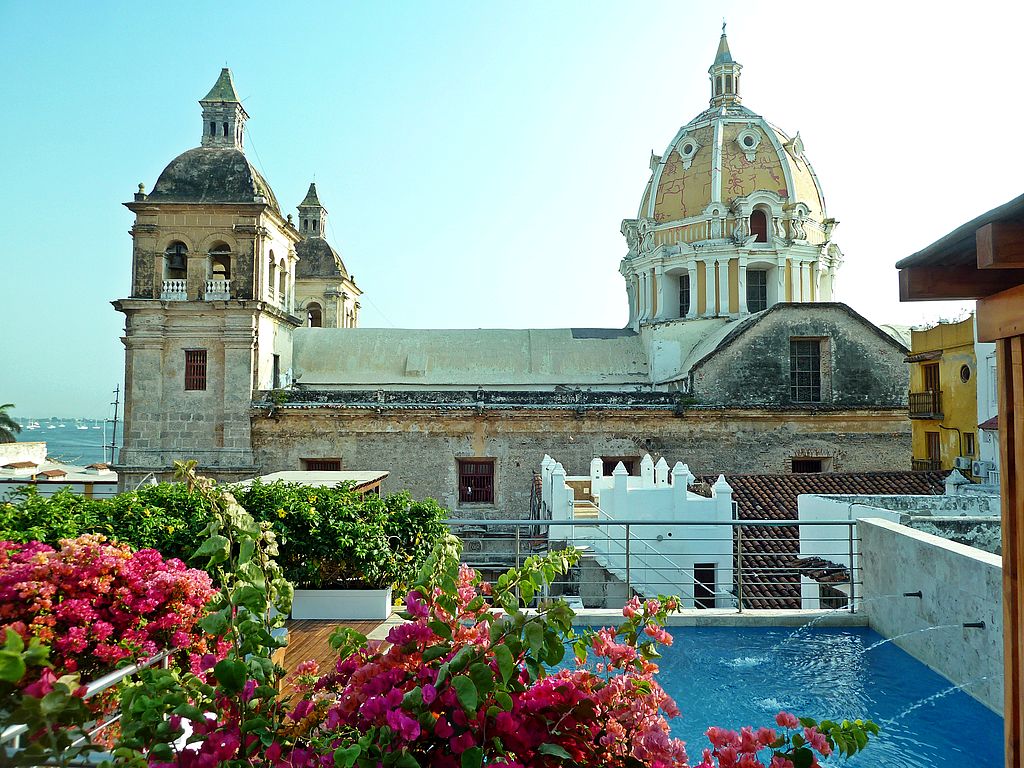
-Cathedral of San Pedro Claver, Cartegena, Colombia

-remains of St Peter Claver, SJ, Cathedral of San Pedro Claver
“Yesterday, May 30, 1627, on the feast of the Most Holy Trinity, numerous blacks, brought from the rivers of Africa, disembarked from a large ship. Carrying two baskets of oranges, lemons, sweet biscuits, and I know not what else, we hurried toward them. We had to force our way through the crowd until we reached the sick. Large numbers of the sick were lying on the wet ground or rather in puddles of mud. To prevent excessive dampness, someone had thought of building up a mound with a mixture of tiles and broken pieces of bricks. This, then, was their couch, a very uncomfortable one not only for that reason, but especially because they were naked, without any clothing to protect them.
We laid aside our cloaks, therefore, and brought from a warehouse whatever was handy to build a platform. In that way we covered a space to which we at last transferred the sick, by forcing a passage through bands of slaves. Then we divided the sick into two groups: one group my companion approached with an interpreter, and I addressed the other group.
There were two blacks, nearer death than life, already cold, whose pulse could scarcely be detected. With the help of a tile we pulled some live coals together and placed them in the middle near the dying men. Into this fire we tossed aromatics. Then, using our own cloaks, for they had nothing of the sort, and to ask the owners for others would have been a waste of words, we provided for them a smoke treatment, by which they seemed to recover their warmth, and the breath of life. The joy in their eyes as they looked at us was something to see.
This was how we spoke to them, not with words but with our hands and our actions. And in fact, convinced as they were that they had been brought here to be eaten, any other language would have proved utterly useless. Then we sat, or rather knelt, beside them and bathed their faces and bodies with wine. We made every effort to encourage them with friendly gestures and displayed in their presence the emotions which somehow naturally tend to hearten the sick.
After this we began an elementary instruction about baptism, that is, the wonderful effects of the sacrament on body and soul. When by their answers to our questions they showed they had sufficiently understood this, we went on to a more extensive instruction, namely, about the one God, who rewards and punishes each one according to his merit, and the rest. Finally, when they appeared sufficiently prepared, we told them the mysteries of the Trinity, the Incarnation and the Passion. Showing them Christ fastened to the cross, as he is depicted on the baptismal font on which streams of blood flow down from his wounds, we led them in reciting an act of contrition in their own language.”-from a letter by St Peter Claver, SJ
“To love God as He ought to be loved, we must be detached from all temporal love. We must love nothing but Him, or if we love anything else, we must love it only for His sake.”-St Peter Claver, SJ
“Seek God in all things and we shall find God by our side.”
-St. Peter Claver
“We must speak to them with our hands by giving, before we try to speak to them with our lips.”
—St. Peter Claver
“To do the will of God man must despise his own: the more he dies to himself, the more he will live to God.”
-St. Peter Claver
God of mercy and love, you offer all peoples the dignity of sharing in Your life. By the example and prayers of Saint Peter Claver, strengthen us to overcome all racial hatreds and to love each other as brothers and sisters. We ask this through our Lord Jesus Christ, your Son, who lives and reigns with you and the Holy Spirit, one God, for ever and ever. Amen.
Love,
Matthew
Sep 29 – St Michael the Archangel, Defend Us in Battle
“Be sober and vigilant. Your opponent the devil is prowling around like a roaring lion looking for [someone] to devour. Resist him, steadfast in faith, knowing that your fellow believers throughout the world undergo the same sufferings. The God of all grace who called you to his eternal glory through Christ [Jesus] will Himself restore, confirm, strengthen, and establish you after you have suffered a little. To him be dominion forever. Amen.” 1 Peter 5:8-11
The last thing the Evil One wishes is our despair. Resist him, solid in your faith.
Resist him, solid in your faith. We used to call this Spiritual Warfare. The Lord’s love is infinitely stronger than any evil. He is God. He cannot be defeated. The Prince of Lies wishes us to believe he can defeat Him. It is a lie. Do not listen to him. With the power of prayer and trust in the Lord, banish the Liar to the void of suffering from whence he came for his rebellion against God, to which he wishes to drag us all. Resist him, solid in your faith.
Saint Michael the Archangel,
defend us in battle;
be our protection against the wickedness and snares of the devil.
May God rebuke him, we humbly pray:
and do thou, O Prince of the heavenly host,
by the power of God,
thrust into hell Satan and all the evil spirits
who prowl about the world seeking the ruin of souls.
Amen.
By the intercession of St. Michael and the celestial Choir of Seraphim may the Lord make us worthy to burn with the fire of perfect charity. Amen.
By the intercession of St. Michael and the celestial Choir of Cherubim may the Lord grant us the grace to leave the ways of sin and run in the paths of Christian perfection. Amen.
By the intercession of St. Michael and the celestial Choir of Thrones may the Lord infuse into our hearts a true and sincere spirit of humility. Amen.
By the intercession of St. Michael and the celestial Choir of Dominions may the Lord give us grace to govern our senses and overcome any unruly passions. Amen.
By the intercession of St. Michael and the celestial Choir of Powers may the Lord protect our souls against the snares and temptations of the devil. Amen.
By the intercession of St. Michael and the celestial Choir of Virtues may the Lord preserve us from evil and falling into temptation. Amen.
By the intercession of St. Michael and the celestial Choir of Principalities may God fill our souls with a true spirit of obedience. Amen.
By the intercession of St. Michael and the celestial Choir of Archangels may the Lord give us perseverance in faith and in all good works in order that we may attain the glory of Heaven. Amen.
By the intercession of St. Michael and the celestial Choir of Angels may the Lord grant us to be protected by them in this mortal life and conducted in the life to come to Heaven. Amen.
O glorious prince St. Michael, chief and commander of the heavenly hosts, guardian of souls, vanquisher of rebel spirits, servant in the house of the Divine King and our admirable conductor, thou who dost shine with excellence and superhuman virtue deliver us from all evil, who turn to thee with confidence and enable us by your gracious protection to serve God more and more faithfully every day.
Pray for us, O glorious St. Michael, Prince of the Church of Jesus Christ, that we may be made worthy of His promises.
Almighty and Everlasting God, Who, by a prodigy of goodness and a merciful desire for the salvation of all men, has appointed the most glorious Archangel St. Michael Prince of Thy Church, make us worthy, we beseech Thee, to be delivered from all our enemies, that none of them may harass us at the hour of death, but that we may be conducted by him into the August Presence of Thy Divine Majesty. This we beg through the merits of Jesus Christ Our Lord.
Amen.
-St Michael the Archangel, Scipione Tadolini, 1865, Rotunda, Gasson Hall, Boston College
Love,
Matthew

